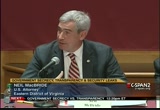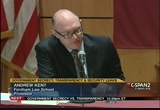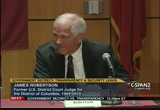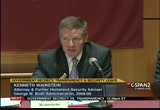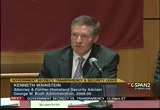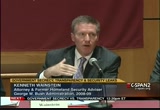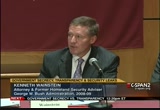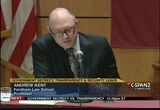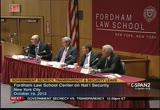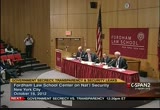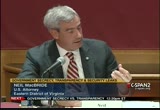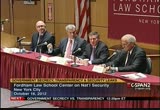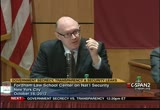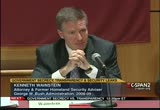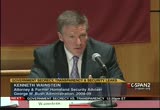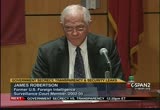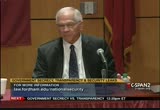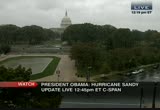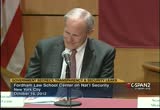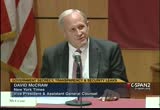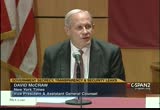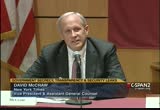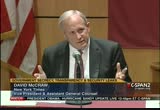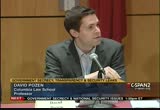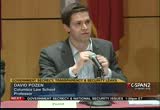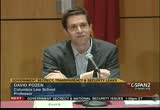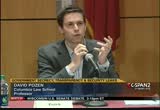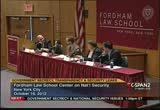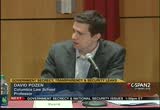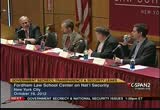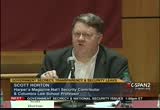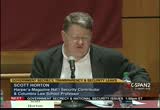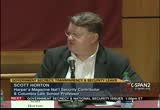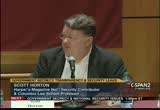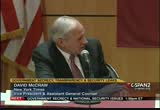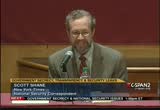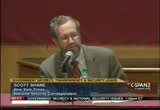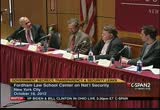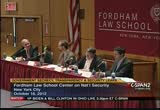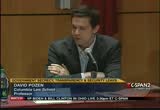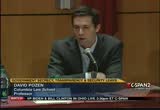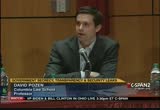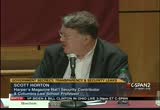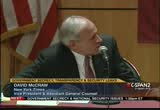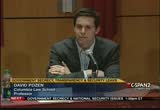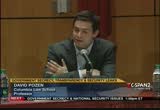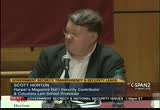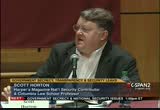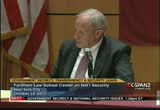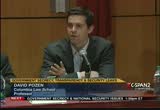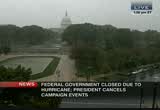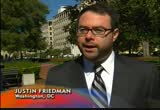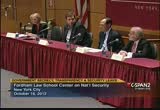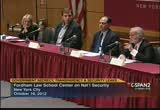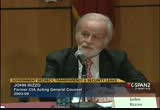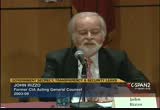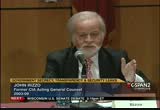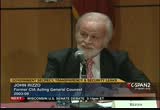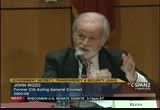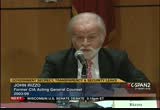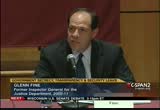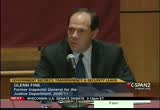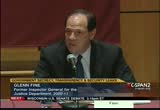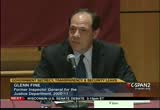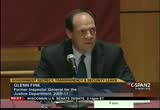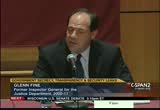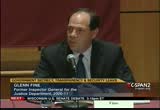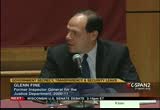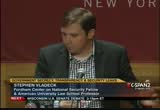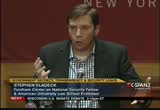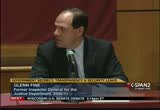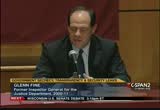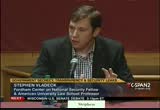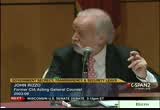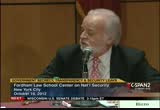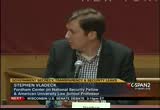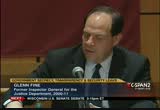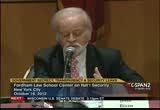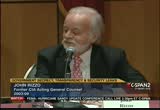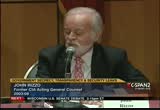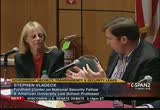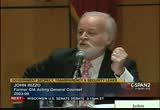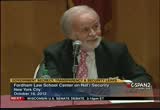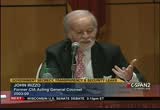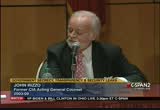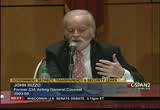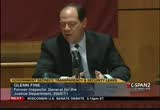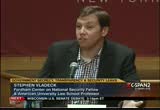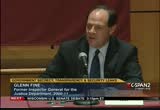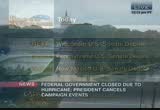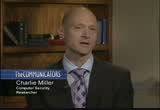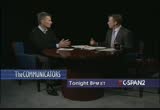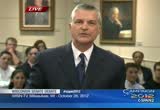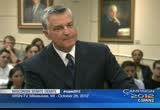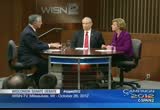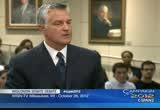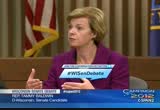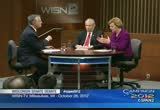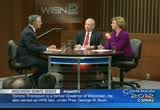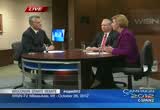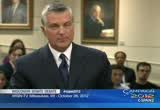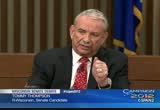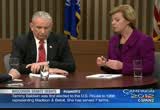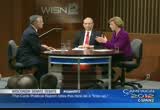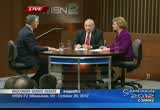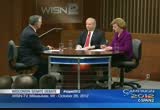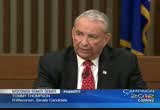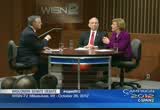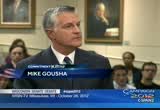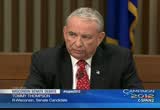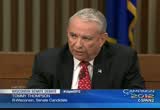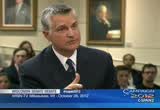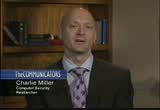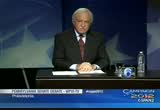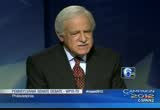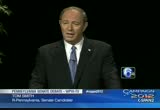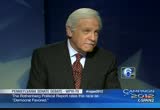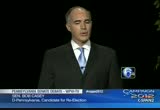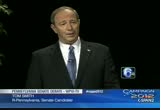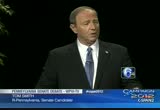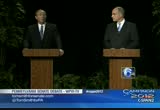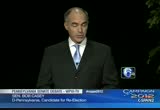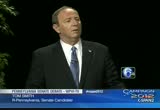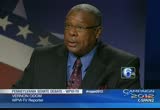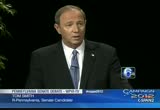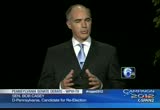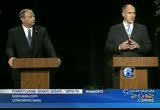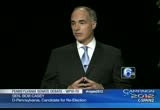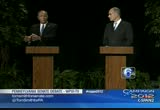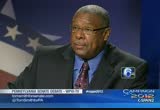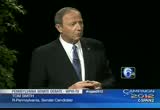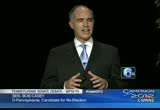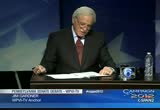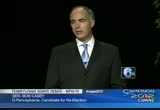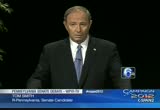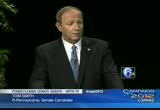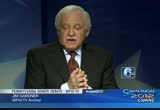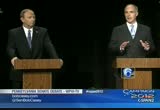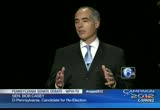tv U.S. Senate CSPAN October 29, 2012 12:00pm-5:00pm EDT
12:00 pm
you know, to share with the public, the media, indeed congress recognize that when it passed this. there is a provision that whenever the justice department has stepped dismiss account or a case because of an adverse seeker, then make that disclosure to the appropriate intelligence committees on the hill. it's not something that we can come to a conference like this and talk about. and so that is something that i always a encourage folks to keep in mind as they think about these cases. and i know it has a certain, you
12:01 pm
know, you just need to trust us sound to it, but it literally is the case, and that was how congress decided the statute. >> something -- i was hoping we could talk a little bit about the changing or least what some people think is the changing media environment. you mentioned we have not had prosecutions of reporters are media organizations, but i am wondering if your thoughts, and the challenges posed by the changing media landscape, the emergence of new organizations, new technologies that might not be, you know, as responsible end willing to listen to governments but requests not to publish -- are we looking at kind of a new era because of the internet, the fragmentation of the media environment? what kind of challenges might
12:02 pm
there be for the classification receipt -- regime and for prosecutors going for? >> you mean, a broader journalist puts that's one question. it certainly complicates the issue. let's put it that way. a blogger is not the gray lady of the new york times. that's all i have to say about the subject. [laughter] >> put your finger on today's challenge. this is not just worrying about the occasional article that shows up in the front page of the post and the new york times. your thinking about now whole new types of journalists or media that don't operate under the constraints that are traditional media do. and i give a lot of credit to the "washington post" and the
12:03 pm
others. when they have classified information that they think would it -- jeopardize information to believe they bring the fact that they have that information to the government and say, look, make the case for why we should not disclose this. there is a give-and-take, and that often results in delay of the publication of a classified affirmation or the media outlet agreeing not to publish it. you know, i alluded to a situation where i think that newspaper made the wrong call which was to publish an article about the program which was a very well-run program. no abuse or anything involved. the treasury program. the times believe it -- the times decided to publish that. they now recognize that was a mistake because there was no smoking gun there. all the accomplice was undermining a very good and important program. but for every bad decision there have been some good ones.
12:04 pm
so your traditional media outlets, your bloggers are not going to. and obviously the best example of the media and the new types of media that are allowed out there by the technology we have now is wikileaks. and wikileaks is, you know, sort of a classic example of this challenge. i think this is the follow-on from the judge's comment about is a blocker a journalist. i guess their is a question. okay. journalists, if we differ in give them some protection, how far does that extend? does that extends to everybody who engages in a keystroke? or is there something, somewhere you can define who is a journalist, who is deserving of the protection of the first amendment into is not. a lot of people say that is a dangerous game that you cannot draw lines with. new media and technology. an argument that with the wikileaks situation, sort of one of the things i've testified
12:05 pm
about in the past is can you actually distinguish wikileaks from the rest of mainstream media? as a constitutional matter, a legal matter, but also policy matters such that if the government goes ahead and prosecute wikileaks under the espionage act, with the rest of the press say, okay, they are being prosecuted. the first prosecution of the media ever brought, but we don't have to worry that they're going to next come after us. we don't have to worry that the government is now going after the media because wikileaks is very much distinguishable from us, and obviously the areas of distinction are they great lady do about all the news, the prince. the publishing stories that have public interest and educate the public. wikileaks by contrast is all about just disclosing secrets. you know. the press, typical press, investigative journalism, that is how they get their permission wikileaks sets up internet lockboxes all designed to
12:06 pm
collect possible automation in a way that can scrub the laws. so you have these distinctions between methods and the missions of wikileaks versus traditional press such that if the government decides to bring a case in wikileaks i have some confidence that the rest of the press will not be chilled. but, obviously that is a tough line to draw. and it is getting tougher and tougher with more immediate, more news being disseminated by sort of these alternative routes , bloggers and the like. >> so let's do one more question here and then we will take some from the audience and a couple of minutes. so picking up, again, on the judge's comments about -- about some extent of over classification or misclassification and also on cans discussion of the hard issues that are posed by the legitimate was a blow or, the
12:07 pm
person who legitimately is motivated to disclose some kind of wrongdoing. i once asked about something that we hear a lot in cases about discovery in civil lawsuits. not so much. the idea that, perhaps, something is government conduct is arguably unlawful in some respects, then they're should be more of a presumption in favor of disclosure, you know, that the equities in favor of keeping it secret might be diminished in some way. i wonder if you think that is right, if you think in a different areas, discovery, you know, criminal context, whether it's appropriate to take that kind of new -- you or not. >> i mean, i don't think i have my say on this from the perspective of a prosecutor if we are referred , i guess @booktv case for government official or a third-party leaks sensitive
12:08 pm
national defense information, that is really our focus. i mean, i am not aware of cases in my district where an allegation is by the defense or a third party that there was something and toward going on on behalf of the information that was leaked. and so, you know, as ken said, there are numerous structures in place these days for whistleblowers to report information. that is true, even in the justice department. our former inspector general is here, and the hajis have structures in place, have structures in place to receive those kind of allegations of waste, fraud, abuse, you know,
12:09 pm
illegal activity, what have you. and it seems to me that that is -- that is the proper recourse if the government employee believes that something untoward is going on with the structure of the congress. and i don't think that the justice department would, you know, would necessarily expect to get a referral from an intelligence agency and a case involving this sort of thing. >> let's take a couple of questions from the audience. i ask you to please be sure and to the point. and we always have a preference for questions rather than statements and speeches as well. that goes without saying. anybody? >> did you go into a little bit more detail about. [indiscernible] >> please wait for the microphone to come before you ask your question.
12:10 pm
>> sorry. did you go into a little bit more detail about the process you were just describing, the whistle blower process and how that differs from the one that congress is working on right now? the mechanisms and how someone actually goes about reporting abuse and that sort of thing, thank you. >> i did not here. >> i'm sorry. i missed the last part of that. the question is, how does the whistle-blower process work. reporting. okay. >> well, i'm not -- if i understood you correctly, congress is looking at some additional changes are tweaks to the whistle-blower statute, which i'm not familiar with. what i was saying was that over the last, you know, 20, 30 years congress has passed several kind of landmark statutes dealing
12:11 pm
with -- creating well-defined processes of protections for whistleblowers to cross the government at large, including individuals to work for the defense department or for the intelligence community. there are specific statutes the deal. men's to address with issues that are -- have been classified , whether correctly or otherwise, but the actual information that is waste to be shared by the whistle-blower is itself classified, so congress has created the statutes that allow avenues for that individual without fear of prosecution or investigation or sanction from their agency to report that information directly to the hill or into their own inspector general, you know, up the chain through their agency. i am not an expert on those. others might have more experience with other work, but i no -- my understanding is
12:12 pm
that, you know, there are thousands of whistleblowers yearly to make reports through these chains across the landscape of the federal government, and so the process, you know, my sense anecdotally from talking to inspectors general across the government is that they think that, you know, processes are robust for someone and it seems to work well from their perspective. >> i think the point i was making earlier is you have to make short that several things about the statute, one, it is user-friendly, that it is the kind of thing that if i am an employee and now wants to up logic applied to blow the whistle, it is easy to do, not something that is amelya no, i really have to go out of my way to do. i have to have confidence that if i do raise the concern up through those channels that it's actually going to be addressed so it does not to sit there and language for six months before someone takes a look at it. dressed quickly and substantively and then, of
12:13 pm
course, the last thing is i have to have confidence, if i have tell myself of that channel for raising a complaint that i am not going to be retaliated against, and as we know, retaliation is not just being fired. it is all this more subtle action that can detrimentally impact someone's employment. so that is where the government has to keep focusing on. i think that will be discussed this afternoon. >> other questions? here. the woman in the second row. >> hello. i'm curious about what you think, what kind of restrictions you think should be in place for throwing information over the wall or sharing it between government bodies? >> she asked -- >> transit the question. >> at the question was what
12:14 pm
restrictions there should be about throwing information of a wall or among government entities are bodies. okay. i will take a crack at that, but i think you're getting to an important point here which is, there have historically been the limitations on the transfer demands of information within the government among agencies. you alluded to the wall. the wall, at least in my world, my former world, i guess, is the sort of policy and rules that were in place that prevented the law enforcement folks, the fbi from sharing information with the intelligence folks, the cia and the intelligence operators in the -- within the fbi. prevented those two bodies, government personnel from sharing information about common targets of international terrorists. that was the wall. without getting into the story,
12:15 pm
the wall was taken down by the patriot act. reaffirms by the court of appeals, and as a result, we now have sharing about national terror cents buys across the government, which has been a great operationally. i mean, john and i can talk about things and share with our colleagues in a way that we were not able to do, our counterparts were not able to do before september 11th and the patriots. the problem there, of course, is the more people who have access to this information, which is what we want, to give a real-life scenario, what you're talking about, a terrorism investigation in the united states, you're looking at it in the united states, you need to have integration sharing from the cia and their overseas collectors who are getting information about let's say the pakistan end of that network to the fbi headquarters who are getting that information and then sharing it with the fbi folks in the field, whoever that cell is and the local law enforcement folks who are actually out there in the streets. so all these people need to know the information it will be fully
12:16 pm
effective. the problem is, of course, that raises the possibility of that that affirmation will be compromised. and, you know, we saw that. he was able to get access to an amazing amount of information, even though he is relatively low-level military. that is an operational concern. the decision has been made. better to have more information spread farther and water within the government so that we are all more effective and then we will worry about trying to keep people from looking at intermission, but that is, you know, one of the reasons why we are having leaks. >> i believe you are serving. the wall was coming down. did you have any comments on this topic? >> well, i believe you were serving as the law was coming down. >> yes. well, the amendments, the patriot acting as the game pretty dramatically.
12:17 pm
basically the patriot act made something like potted plants out of the judge's on the question of what the intelligence purpose of a warrant was. if it is certified by the attorney general and by the director of intelligence, national intelligence that a warrant is for an intelligence purpose then that is the end of it. the judge may not look behind that. does not look behind that. and the fisa board of review decision that can refer to -- obliterate the so-called wall. by the way, the -- scheme may have all read recently a report that some inspectors general issued on these so-called feasance centers and what a
12:18 pm
waste they are of money and time and how they are not being very effective at all. it is another example, it seems to me of the mess we have gotten ourselves into. we cannot even -- we can't even agree that the fbi and the cia and local police can share information without doing it through the fusion center, which costs megabucks ever replace, and we are -- and builds another whole level of bureaucracy into our system. i don't know if that is responsive. >> i think it is. and please join me in thanking our distinguished panel. [applause] >> here is what is coming up. next, more from the ford and university form of government secrecy with the panel on government secrecy and transparency.
12:19 pm
we will then wrapup that event with a discussion on government secrecy and national-security issues. and later, a debate between candidates to become wisconsin's next u.s. senator. a live look at the u.s. capitol here where hurricane sandy has shut down the federal government for the date and several local school systems for tomorrow. many of the evidence we had planned to cover have already been canceled, but the white house has announced that president obama will address the nation at 12:45 p.m. eastern and will have that live for you on c-span. hurricane sandy has put a crimp in the final week of the presidential campaign, but has not stopped some events in the crucial swing state of ohio from taking place. vice-president biden was there today's topic for reelection. expected to be joined by former president bill clinton, and you can watch that live at 3:30 p.m. eastern on our companion network c-span. >> as you consider that, you know, while ago no one would
12:20 pm
ever agree to carry around a tracking device. now we all carry around cell phones, which you can inherit the track. no one would ever have posted, you know, let anyone read their you know, right now all of us use the e-mail and it's all store on the server by go will. and so this is interesting that we, as a society, have given our information out. >> we were looking into cyber and cyber security, cyber war. the pentagon had declared cyberspace the environment of people and machines and networks as a new domain of war, and yet we realize that maybe one in 1,000 people really understood what cyberspace was and the degree and depth of the vulnerabilities. and so what we are trying to do is to take pieces of it and explain the fundamentals of the platonic idea that everybody
12:21 pm
from my mom and dad to congress and people around the country can understand so maybe start the process of coming up with ways to defend cyberspace better. >> cyberspace will abilities tonight at 8:00 eastern on the communicator's on c-span2. >> we have a pretty simple proposition here. you can either embrace the kind of approach that congresswoman wilson has embraced. see signs this pledge to support the captain balance program. that is a tea party approach to balancing the budget. has no new revenues, even for the wealthiest americans, and it is so draconian that it would require deep cuts in social security and medicare overtime. or we can embrace a balanced approach. that is what i support. i think we can go back to the kind of tax rates we had and the clinton administration, those upper income earners were doing well and the entire economy was growing. we are going to have to make
12:22 pm
some tough choices. a balanced approach is the only approach that i believe will get us there. >> heather, your rebuttal. >> it is amazing to me, congressman, that you can stand here having voted for trillion dollar deficits for the last four years. the largest, fastest debt increase in american history and say that we have to control spending. you have done nothing to control spending of the last four years, and with respect to cuts, cap, and balance it is amazing to me also that the idea of cutting wasteful spending, capping the ability of congress to spend money we don't have and balancing the budget is extreme. i think it would force congress to set priorities and stop funding things like solyndra and prioritize things like social security, medicare, and education, and that is why i support a balanced budget amendment to the constitution. >> the race to succeed retiring new mexico senator is just one of the key house, said, and governors races you can follow
12:23 pm
on c-span, c-span radio, and at c-span.org / campaign 2012. >> more now from the reason for a moscow conference on the balance between government secrecy, transparency, and public access to information. these next panelists analyze the implications of various national security leaks, including military wikileaks. this portion of the conference included remarks from various national security reporters and law professors. the center on national security hostess event. this portion is about an hour and 30 minutes. >> welcome to the afternoon session. this battle promises to be every bit as electric as the earlier one in a way that i think he might not imagine. i want to welcome the moderator,
12:24 pm
david mccrory, who is new to the center and has never been here before. i hope this is the first of many such appearances. he has one of the most unknown and important jobs you can imagine. i'm not sure how to describe it. he probably won't, but he is the assistant general counsel for the new york times and vice-president there. so his job is to tell them, in other words, what they can do and what they cannot do and to think about things from libel all the way to the issues surrounding leaks. and as you know, from reading the new york times and other papers for the past few years, from the wikileaks scandal to other issues, there have been numerous occasions in which he has probably spent a number of sleepless nights. so -- and i think you're going to very much enjoy him in this panel. so join me in welcoming the panel. [applause]
12:25 pm
>> thank you. anybody who has worked at the new york stock -- new york times know that my job cannot have of telling people what to do. , on the panel today, former special adviser to the state department. seated next to him. scott is a legal affairs national security contributor to harper's magazine, adjunct faculty member at columbia law school. one of the people who writes a great deal about this. and next to me, stock exchange, national security reporter in the washington bureau of the new york times. i have been told that i am supposed to interrupt everybody. no one has been told to interrupt me. i'm looking forward to trying to move this conversation along and address what i think is certainly from my side of the aisle an interesting issue, which is how does this play out
12:26 pm
when there is information that is classified as up in the hands of the press, the legal paradigms' that should govern that, how it works and the practical matters of the real world. i come at this issue in a variety of ways. i currently am litigating on behalf of the new york times the suit to obtain what we believe actually exists, although the government denies or refuses to say, legal memos underlying the drawn strikes. my colleagues from the aclu have similar lawsuits and are here today as well. but probably the way that i'm most poignantly was involved in this issue was with wikileaks. on june 203rd, 2010 to my received a call from bill colors secretary to come to a meeting that was about to take place. i was at the oral surgeon bleeding heavily. gauze and my mouth.
12:27 pm
i explained to her that i was at the oral surgeon and it had not gone well and had a bloody gauze and my mouth and libya could come later. she said, no, you want to come now. i came and continue to bleed for the rest of the date. the meeting was around the idea that we were going to get copies of the first set of wikileaks cables if. over the next month leading up to july 25th 2010 when the times published the first set of wikileaks tickets, you can imagine from my perspective as well as from the journalists perspective, it was an incredibly busy time. i tried to understand, did not release exceed the the espionage act. i try to understand liability, with the exceptions could be found in the law, what the pentagon papers fun with all those cases came to me, and it was fairly momentous on july july 25th when we first release those, and as a lawyer
12:28 pm
you have this sense, well, what happens now. no prior restraint. pretty confident about that, but what happens now, what will be the consequence for press law, for liability, for national security. and what happened after july july 25th is exactly what usually happens in these situations. i get invited to be on panels all over the world to talk about the issue. that was about it. we never heard from the government. what i found was that wikileaks really became sort of an inkblot test or roszak test of what he cared about. as i went around and talked about it, when i was in china the professors and china raise the question. i talked about how the new york times had been very careful in publishing these and concerned about not harming national security, not exposing confidential informants and other sioux had helped the u.s. government or our allies in afghanistan. and the chinese professor raised
12:29 pm
his hand and said, well, did you call the tell that to find out their secrets. if you are really an independent medium why are you taking sides. i acted like it did not know what the transition had said. confusing to understand that question. when i get to henry, heinrich, a country that understands that secrecy and understands the abuse that comes down in the name of secrecy of government security, the first question was, do you think the u.s. congress will change for vietnam that they see how valuable this information this cost? at think it is safe to say that was not the first instinct of congress, but i was happy when i get back to the u.s. and was on a panel with a prosecutor, a former prosecutor. well, can't we agree that it would be a really good thing for the new york times to be indicted so that we can clarify the espionage act? no, we can't agree on that.
12:30 pm
with that, it has given me an opportunity to think a lot about these issues. if you go back to the pentagon papers, alexander pitbull, a lawyer for the time to my law professor talked about what he saw as a disorderly situation, the government should have broad powers to keep secrets, but once those secrets crossed over to the press, the pressure to have brought freedom to publish. referred that as a disorderly situation, not an ideal situation, not a perfect situation, but a situation that worked. and i think that part of that was also sort of an implicit bargain that on the government side prosecution's, prosecutions and publishes would be exceedingly rare comment on the press side that there would be the responsibility, if you will. consideration, and your nazi that i think some of that bargain appears to be breaking down, at least that is what i want to address the panel. you know have six prosecutions
12:31 pm
in the obama administration after three prior to -- after three prior prosecutions. you now have a press that is not just the new york times, not just the "washington post," but wikileaks, individuals no longer needing the mainstream media to put documents, formerly classified documents into the public environment. so it is a changing landscape on both sides. different kind of media and i think a different attitude in government, at least that is what appears to us. the rise and concerns about terrorism and then the concern for government secrecy, and the ability to transfer large amounts of data electronically. you know, if you think back to the pentagon papers, daniel ellsworth has to come to the new york times or a paper like the new york times to get the secret's out, and that was the only way to make them public, not so now. when the government wanted to do terrible things, they actually had to send people to break into
12:32 pm
his psychiatrist office. no longer necessary. they now have other tools for doing those kinds of things. it seems very old-fashioned, doesn't it? but what i really wanted to start with the panel is as, have things really changed? early some more serious threat now? has the prosecution's shut off the flow of the formation to the public? is it time to give more legal protection to liquors, time to clarify the espionage act? should we visit the scheme for classification? so as things change, and if so, what should we do about it? we will start with everybody has to be named david r. scott on this panel. >> thank you. it is an honor to be here. and thank you for having me. there is so much to say that it will be tough to say within time or maybe just that i am an academic now. i think my charges to kind of
12:33 pm
frame the conversation a bit with some more legal context. opening remarks and i thought i would try to make two main points were established to make propositions to get us going. the first is just out remarkably rarely the law against leaking has been enforced in this country in light of what the laws permit and will political rhetoric might suggest. the second point is that we cannot understand this negligible and fourth rate without thinking about the ways which the executive branch benefits from being which is a sustained practice. just how rare formal sanctions are against liquors relative to the universe a potentially actionable weeks, it is already alluded to, but the most people still out there up only nine prosecutions of leaders to the media in u.s. history. i think that maybe a little bit wrong, but it is roughly nine.
12:34 pm
a journalist has never been prosecuted. administrative sanctions might be thought to be a major backstop. there -- there are a lot easier to bring to the government. criminal prosecutions a tough to bring, it is tough to know exactly what administrative practice has been in this area, but all evidence suggests that administrative formal sanctions against leaders are also very rare. there is a long line of government studies that have suggested that point. there are very few press reports of people being formally disciplined for leaking, not withstanding that those press reports would have significant deterrent value for government concerns to press licking. notwithstanding the media interest to protect sources against reprisal and notwithstanding the discipline and the employee standing proclaiming whistle-blower status. more publicity around administrative sanctions, if they had occurred. i also submitted a bunch of requests for research and i'm doing. not all those returns are in,
12:35 pm
but they suggest that lakers' throughout the u.s. government are very rarely formally punished. the second point is that there are a lot of leaks of classified information. i doubt that i need to provide much foundation for that point to this audience, but a government report, the willard report, an interagency task force in 1982 called classified information leaks daily, a routine daily occurrence in washington. there is a claim that their daily. the w. m. decommission public report in 2005 referred to hundreds of serious press leaks across information over the past decade alone. the third point is that most of these classified information leaks are potentially prosecutable. the willard report again from 1982, virtually all cases the unauthorized disclosure of classified and permission
12:36 pm
potentially violates one or more federal statutes. the main statute involved has a lot of insecurity that i won't rehash here, but generally you have to prove that the defendant knew his or her actions were unlawful, that information was not already in the public domain , and in some circumstances you have to show potential damage to the national security from the disclosure. courts have define that term very broadly to implicate most foreign relations of permission. but given that this standard for classifying a document is anticipated to damage to the national security and that no court has ever accepted a defense of improper classification of a document and that millions of federal employees to sign nondisclosure agreements when they are ready to classified programs saying that they realize that disclosure of that classified information will damage the national security, it is actually quite hard to see why most disclosures of classified intel are not at least
12:37 pm
potentially prosecutable under the espionage act main section. moreover, it is not just the espionage act. there are a number of other statutes, criminal statutes, potentially applicable to leaders, perhaps most notably 18 u. s. c. 641, the general divergence statute. it criminalizes that conversion of property or other things of value or the -- of the u.s. government. most circuits and although there is some split, read that to cover intangible information, including classified information as well as tangible documents. so 641, at least to most of the country seems like he could catch all classified affirmation leaks and much more and finally the whistle-blower laws are very -- variable protection, and no circumstances today of price disclosure of classified and permission directly to the public. so you put all this together
12:38 pm
kiss him all that i just said about the frequency of leaks, how they can be prosecuted and how rarely they are. you end up with a de minimus enforcement rate, at least on the criminal side. gary ross, a student athletes estimated recently that the 03% of all potentially indictable classified informational weeks to get indicted in u.s. history. that was using an extremely conservative estimate of what that universe a potentially possible leaks is, basically ones that have been publicly knowledge of the u.s. government to have occurred had been referred to the just apartment. the real rate is pro which closed zero. so even with the recent uptick in these prosecutions under this administration, while it has been branded a war against leaders by a lot of people, it is really more of a special operation. and just statistically i think that point helps -- might help provide some context. there's still very rare. that is not to minimize the
12:39 pm
significance of what is happening. i think this will be talked about, not to suggest it is not an important new development, but statistical perspective might be useful. so then a puzzle rises. why is there so little enforcement against the lakers? if i'm right about all that i just said. in time does not permit me a full answer here, but let me just say quickly, i think the standard reasons that you hear are insufficient. you hear two main things. the first, and this came out in the first panel this morning. it is so difficult to catch them. they conceal their actions can operate in secrecy. that has some truth to it, i think, but is unsatisfying and several levels. first, someone other than the leader knows to leaked in almost every case, and that is a journalist. the department of justice since 1970 has had a very restrictive policy that is a self-imposed, it is not constitutionally mandated, making it extremely difficult to subpoena a journalist, and this also came
12:40 pm
out this morning to may has only happened a few dozen times. administrations have also -- the cs me, forgone certain powerful investigatory tools to get at leaders. ronald reagan famously order to mislead in the early 1980's proposed a systematic program of polygraphs for all suspected cases. and every official who meets with the media would have to give prior notice of that meeting in right at the report and submit a memo afterwards about what was discussed. there was huge backlash that only from the press but from within the administration against those proposals and they have never been implemented. polygraphs are used by some agencies in some the circumstances but are not the norm. finally, even not withstanding the restrictions that have been put on its work, doj has had some success in catching them when they have been brought to the attention. we don't have much public data, but we know that from 2005-9 doj
12:41 pm
initiated 26 investigations of leaks that were referred to it from the intelligence community and that it identified a suspect in 14 of the 26 cases. now, there may be some selection. iris and the fbi does not open investigations if it thinks there are bound to be consulted, but 14 out of 26 is a decent success rate. that suggests many more can be caught within standard resource constraints. quickly i will just say that the other thing you hear is that it is so tough to bring these prosecutions, this cannot this morning as well, national security might be put at risk by the very act of bringing these prosecutions as if you need to disclose some classified information. prove your case and the defense tries to disclose such information for its defense. well, one thing to say about that is specified and permission procedures act was designed in 1980 specifically with these dilemmas in mind. it may not be perfect, but there is a reason burden on those who would say it is not working to show why.
12:42 pm
moreover, if you bring up the prosecution in the pretrial rulings by the judge even freer prosecution or for national-security reasons, a plea agreements to exist as a backstop to the case that has come up resulting in a relatively light, you know, conviction, but it is widely described as a failure of prosecution, but in terms of the actual experience punishment for someone who is accused of being a leader as well as the deterrent effect to other would-be leaders, it is a powerful success for the government permit even though a plea was all that was attained. moreover, other statutes, not just the espionage act, particularly 641, the theft statute which can be charged with less as a security risk the there is even more evidence of a government not prioritizing enforcement. i would say one is that only a fraction of classified and permission leaks ever get referred to doj. this has been alluded to in
12:43 pm
prior testimony by doj officials. basically the cia and nsa make some referrals. almost no other component ever does. if the fbi's act is too clumsy and that is a reason for not being able to make successful cases you'd expect some white house to prioritize legislative reform. no white house ever has, specific parts of the executive branch have made proposals of the years. president clinton vetoed a major legislation in 2000 that would have strengthened in the espionage act significantly. there has been no revisiting of the subpoena policy since 1970, even though that is a real handicap on investigators. and moreover, you might expect administrative enforcement to pick up some of the slack if it is all about how tough is to bring cases. okay. shift enforcement to the administrative robber we don't have to go in front of a judge publicly with our permission. as i suggested earlier, there is hardly ever any administration sanctions. so to me here is what i will propose provocatively in quickly
12:44 pm
at the end. i should yield the floor. the missing pieces of discussion, the executive branch benefits in various respects from a systematic practice of being permissive. that does not mean that certain particular leaks might not be destructive for worthy of our criticism on whenever grounds, but i am talking here as a general practice. very quickly, what might that be the case? one reason is that being permissive about leaks allows you to a have a more robust ability to it, what some journalists call plant stories. if you want to make unauthorized disclosures informally and richard b. of classified information from the white house you cannot be too vigorous in europe crackdown on the unauthorized disclosures. why is that? imagine a world in which the executive branch very, very vigorously cracks down on non white house authorized leaks. we would then become very cynical and suspicious about
12:45 pm
every other treated disclosure we saw in the newspapers because we would expect if it was the white house authorized it would most often used some kind of observable sanction like a prosecution. this is to a puzzle raised by marty in the previous panel. but he says, it is all about not official acknowledgement, the white house wants to plant stories to get information out there of what it is doing without officially acknowledging, but this raises the question. if everyone knows that all these things you see in the newspaper are tantamount to official acknowledgement then the whole game collapses. unless people are almost silly in the level of formalism air, but so how do you preserve that constructive ambiguity about whether this disclosure really is the u.s. functional officials acknowledge that are not to maquis have to allow some given the system, some amount of unauthorized or cause i have not rise licking, at least that is my claim. very quickly, few other factors.
12:46 pm
most police that occur are not like bradley manning. they're not discloses that are unauthorized at any sense of the term i complete the robo level actors. most actually occur in this middle space between full presidential authorization and no authorization, their biases and secretaries of the state department, defense department, people of relatively senior rank who are ambiguous as to the extent to which their authorized and not to implicitly or especially speak with the press. prosecutions of these officials do i think are the majority, would expose the machinations of high-level government actors to make any administration look bad it would upset agencies and so on, and they would you do the essential security benefits because these are not, again, wrote actors who are striking out unilaterally but people who are deeply acculturated to the norms of executive branch practice and have internalize some red lines that they will not cross. that is of that will be talked
12:47 pm
about. these are people who on multiple levels are tough to prosecute. finally, big literature of leaks as a form of internal communication within the executive branch, how they allow you to bypass the awkwardness and the cumbersome this of formal communication channels. a great quote from secretary of state haig during the reagan administration. he says, by the end of the administration reconvert the new york times and "washington post" into our white house bulletin boards. so leaks have a dialogic deliberate value within government for government officials. i think they serve a strategic pre commitment to function. there are a lot of executive power scholarships that emphasize how if you want to be credible as an executive branch to stay in power over time you have to signal to the public that you're acting in a law-abiding and responsible way. how do you do that when you have such a blood a classification system? one way is through leaking this. if we all as citizens expect that basically anything really vile that the executive branch
12:48 pm
does will come out because it looks like a sieve, as we all know, it actually increases our faith in the government in that it is not doing truly hideous things. i think finally being leaky staves off more fundamental and painful reform. similar to the last point made committee executive branch is not forced to address the massive over classification problem, in part because constituencies for transparency, including congress and the media deal adequately served by our system that they're getting the impression they need. so in some might think the situation we have, while david referred to it, using because language famously as a disorderly situation, it's actually a lot more rational than it may be seems on its surface, and we should be skeptical of claims that this is some kind of a suicidal bind we have set ourselves into in the way we have so much looking to be the executive branch for
12:49 pm
bless the status quo. >> i would have cut you off center if i knew you're going to "alexander haig. the came out of nowhere. let me just follow put one question because you have managed to transform this into a nice discussion. i want to go back to the prosecution. i say this just to provoke questions about it and buts about it, isn't it a little bit like the steady it showed that there were very few beatings, the conclusion was that slavery must have been a humane system because there were not -- there were not that many slaves were beaten. but you don't have to be every slave-slaves conform to the masses will. have you strategic prosecutions have a much wider range effect on and on prosecuted? >> an important question. one response is that you might hear that whenever little observable sanction you might
12:50 pm
have is so thoroughly internalized by the actors within the system they just don't need to bring the cases. that is not consistent with the volume of leaks that seem to occur. people don't seem cowed. but i think it is right. i think the -- i think the long answer, i will say basically there is a two-stage or two level enforcement system in the executive branch. most officials at the senior level are not realistically subject to criminal prosecution. they are therefore not going to be cowed, not deterred. they are, however, subject to informal sanction. there are a lot of stories and reports of people who are excluded and interviews to are excluded from meetings, not promoted, marginalized in various ways because there seem to have leaked in the wrong source of respects. that's is in senior official them. a lower-level employee does not want to be looking at all. more realistically subjects are sanctions, criminal or
12:51 pm
administrative. i think a lot of them probably in the wake of what is happening now are feeling a little more count. they are, and they're is a sense in which this may be an optimal return system for the executive branch to my african just very episodic the and surgically go after and it still a lot of people around him. i think that is possible. it does not speak to the more senior level of government where at least i am proposing much of the action. >> and we will come back to that, but scott gordon, i can tell, was ready to jump in. so the opportunity has come. >> maybe i will start with a bit of a plug. i think we just heard a great presentation that looks at the sociologies of the situation, as the official pars bring to the realities of the way bureaucracy and political actors work and puts an overlay of the law on top of that, and if i have to give you some a sign reading for this function, definitely a sign an article that this man recently published in the
12:52 pm
stanford law review call deep secrecy. i think it is one of the smartest, best recent works on the subject. you should all go look it up. i'm going to try and make a case for a different framing of these issues. we are talking about leaks year. it sounds like a ship that is not seaworthy some help. i don't think that is really the issue we should be focused on. what we really need to address is the quality and nature of our democracy and what we expect in it, and i think that going back a little bit queasy in the interplay of secrecy concepts really a sort of power play. we see a realignment of political decision making within our society and within which people who have the super secret decoder ring, you know, the highest level of national security classification is the
12:53 pm
only people who have access to the vital information that enables them to participate in discussions and decisions about high-level national security matters, and that means, and i think this is an increasing problem, it has resulted in the space available for public discussion and public participation in this issue, shrinking steadily. and this is something we need to be worried about. it is something quite fundamental. and, in fact a much we have a few historical sites here. khrushchev. a couple of others. you know, i think we need to go back to other models much further back. in fact my think we need to go back to the fourth and fifth century bc to greece and look at how they've you democracy. what was the essence of democracy? and they're is a fascinating fragments, a speech given by a philosopher and protagoras in which he gives a sort of
12:54 pm
creation myth. this man now is being cited by philosophers, greek history in the classical age has the prime expositor of expedia democracy in the time if he gets a creation myth for democracy. he says that humanity originally was scattered all over the place. victimized by forces of nature and wild beasts and by other human beings and that humans had sent a symbol together and communities for their own security. so he says collective security is the essential reason for the state. then he gives a myth involving, which is sort of a retelling of the prometheus legend. i don't mean the one in the current motion picture, by the weight. by the way, it may not be a far off semblance of a. in which she says sues, the god, decided to give gifts to humanity and he arranged for these gifts to be distributed broadly amongst the entire
12:55 pm
population because it cities cannot be formed if only if you have these. and he, of course, the political technique. and that is democratic dialogue. what we today know as democratic dialogue. the idea that you have skills, knowledge, spread does he see a much the population, the population coming together, engaging in discussions can come to the best solution pskov and the best dancers principally for their own defense. and finally he says if the city is going to prosper, the state is now to prosper in if it is going to survive it has to effectively for ways of pooling of these resources and channeling them into correct decisions, and it is very, very clear throughout he is thinking about national security as the principal thing that people are discussing here and, in fact, we know through quite recent historical research that in prominent democracies of this age especially, athens, when the
12:56 pm
assemblies of people came together and they were discussing issues very frequently they were discussing questions of war and peace, whether you go to work, whether to make peace and what terms to make peace, and they were discussing deeply and profoundly questions of accountability of their own leaders who were engaged in national security decision making, that they exercise their judgment, that they do the right thing, and the public, as we know, in that era, was a very harsh judges these things. so i think this gives us a marker against which we can measure our own democracy, this really quite radically different thing. in our day-to-day these accountability process these have relief fallen apart and become extremely weak. that is approaching a crisis. now, in fact, we have sort of a triangle, and the greeks talked about this as well. secrecy, privacy, and publicity in every state these three
12:57 pm
different characteristics in different measures. and the way -- the way these three qualities are doled out and measure defines the nature of the state. so, for instance, we are told that in a state where the leaders are allowed to make public decisions about the affairs of the state in secret but the citizens, the ordinary citizens have no privacy, they are always subject to intrusion by the leaders, that system is called. a democracy is defined as a state in which the affairs of the state are public did be known by all the people to participate in important decisions and resolutions whereas the affairs of individual citizens are private and are shielded.
12:58 pm
i think these are, you know, very, very powerful models. in that think we should look at how we have dealt and how we have reallocated the situation. we have a situation in the united states today where increasingly national security affairs of being privatized. the number of individuals are allowed to participate in making those decisions is fewer and fewer, whereas the private individuals is no longer nearly so screened from intrusion by the state as was the case historically, and i think if we look at major questions that we have faced recently, we see the reflection of this process. so, for instance, i think we have been discussing this morning drones, joy warfare is a process being dominated now by the cia. covert warfare.
12:59 pm
therefore it seems to be withdrawn from the table of matters that can be discussed, even at a policy level in a meaningful way as a part of our political process and our democratic process. secrecy is playing a very important role in that process. we also have matters like the war that was wasted libya, which i think mark's some very, very disturbing precedents because we have no -- this beats being given by president obama, no meeting consultation of congress, and a public debate about it. terrible precedents, and we are looking at possible conflicts in the future involving iran and syria again in which intelligence and the manipulation of intelligence by political figures plays a huge role. ..
1:01 pm
right but the government as a whole was obsessed with this drumbeat of doom and gloom and if we look at rick healey -- look at wikileaks individuals were embarrassed by things that were disclosed and people legitimately proceed a little bit of a threat but by and large, that is not the case. by and large the public benefited from having disinformation put on the table and by and large i think the disclosure wreaked more benefits than harm for the united states and it's based on discussions with a number of political figures abroad who has long had of state in africa told me he was shocked to see my god, this government really does care about corruption and really does care about transparency and it was within all of these tables they were actually acting up on the things they were reflecting, so i think it did wonders for the u.s. reputation at the end
1:02 pm
of the day. >> scott, i obviously agree with much of what you said but i wonder if you can come back to a question that troubles me and that is as much as i like scott and i trust my own judgment, nobody elected us to decide whether national security was kind be jeopardized. isn't their something fundamentally wrong under the rule of law scenario where you now take those decisions out of the government and put them in private hands to have scott shane and the likes of scott decide whether this would reveal the secret or not? >> i think it's problematic. we have to start by acknowledging that every government does have legitimate secrecy claims and the government should try to maintain certain diplomatic and military secrets of the obvious sort, and the idea that individual citizens will make up
1:03 pm
their own mind to claim secrecy is problematic. however, we have thousands of cases historic we now where we can show that in fact the secrecy was bogus and disclosure serves legitimate space and so there is no easy solution to this. the fundamental problem we have right now is we have constructed a system where there is no downside for claiming security classifications and if we are ever going to get a handle on the problem of the over classifications, it's got to be creating a new system in which there are risks to a civil servant making the decision to classify something that shouldn't be classified. >> scott shane, the county the to challenge has been thrown down with the philosophers. [laughter] i don't know how you are going
1:04 pm
to raise the bar but i would ask you how you feel and go from there. >> i feel intimidated. i have to bring us back from b.c. to 2012. i guess the question i would like to briefly raised is i sort of agree with david pozen and a couple ways i will mention referred to in the decades of the jury rigged system where the government relates to the press. i am wondering whether in two different ways we are undermining the system as with the proliferation and with publicly classified information. first let me go back and brief something that the washington bureau colleague wrote some of you may recognize this and.
1:05 pm
without the use of the secrets, and of quote because that is what the government calls these things come classified information. either abroad or in washington, and there could be no mature system of communication between the government and the people. that is written in a brilliant affidavit, 1971 by max frankel and later the editor of "the new york times." just as quote only to say that is absolutely true that to this day. this weird system we have that things are designated on secret but we continue to write about them. i think it's actually proven quite functional over the decades and that's a little worried about because the
1:06 pm
strange consensus that operated for many years may be broken down a little bit. i would not and none of my colleagues would deny legitimate secrets that need to be protected and we sometimes take a lot of flak by the government it is a practice if we have any kind of story to call the agency and what about this we're going to write this and we have the opportunity to say the world will end if you print that. i find myself listening to the very peculiar situation when we are publishing the wilileaks diplomatic cables that we had gotten through wilileaks of being a person assigned to actually redact the cables i
1:07 pm
actually consulted with of the state department and they would make the case that pitted the would be in grave danger for name them. we could eventually put all the tables cables out and i would agree the government's warnings about the dangers of that were by and large proven overblown. but let's look at barack obama and to the administration's inconsistency on the subject. everybody knows about enhanced interrogation techniques described by some as torture as used by the cia and the bush administration. everybody knows of the so-called warrantless wiretapping by the national security agency under
1:08 pm
the bush administration. both of those were only brought to light by the leaks. if somebody hadn't stuck his or her own neck out in principal prison to talk about those things we might not know about them today. barack obama of course ran against the enhanced interrogation techniques and he based a considerable portion of the national security component of his campaign on running against these programs that he knew about and we knew about and we could talk about only by virtue of the leaks. so that makes it particularly ironic that there have been six cases by most counts doubled the number under all previous presidents come and that is what i think is beginning to potentially show reporting sources from talking to reporters and so, sort of
1:09 pm
breakdown this system that we've been talking about. long ago i was in moscow and the collapse of the soviet system and i had already written a book the premise of which was partly that excessive secrecy, dysfunctional secrecy was one of the reasons the soviet union was undermined coming and we are not quite at that level but it is amazing how often i have seen in recent years absolutely ridiculous classification. to give you a couple examples an fbi agent, one of the early fbi agents focused on al qaeda, and he wrote a memoir last year called the black flag, and the cia and the fbi as you know have
1:10 pm
a kind of a decade-long feud just about everything. and the cia got a hold of his book and decided it needed to clear the manuscript and took a lot of things out of the manuscript with the kind of things it took out was well known and had written about publicly being involved early on in crushing a guy named abu zubaydah, one of the terrorists caught in 2002 but was considered to be secret even though everybody knew about it. he had written on bits about it and the cia took out the personal pronouns from the chapter about abu zubaydah so instead of saying i packed my suitcase when i got this phone call and headed out it says blank pact blank sood caisse so the taxpayer paid you to take that stuff out. one other example so it seems
1:11 pm
less easy to understand is that the cia has triumphed over a guy named jefferson who has been fighting in court for years to declassify the records related to the assassination of john f. kennedy. you would think that by now stuff that happened in 1963, the cold war is over, most of the people and involved back then are dead it might be safe to let the secrets but they have fought successfully in court to keep hundreds and hundreds of things secret that seem to bear at least an indirect relationship to the kennedy assassination. it's kind of fascinating. i wonder what's in their myself. finally, there is that thiokol publicly classified information the jerome strikes being a prime example.
1:12 pm
the cyber offense, cyber attacks are another one now that is emerging, and it's following a similar pattern. i think what you have is events that occur on the ground such as stuff blowing up and people being killed that you can't deny so some information comes out about it. but there are still these formal restrictions on who can say what. the strange result of that is i can't talk about drones in fact we can all talk about drones' except for possibly david because he was a government employee and may be restricted one he says. most significantly, congress cannot talk publicly about drones so you have a very strange situation with their the u.s. has embarked on perhaps a good bad but very important using this new kind of
1:13 pm
technology in a very dicey the disputed area and there's never been a public debate in congress. did -- dito. stuxnet as part of a wider range of programs called olympic games but we have embarked again on a new technology in a very hazardous in the view of many experts area. we are setting a precedent for many of their country's. congress hasn't been able to talk about that but it's classified. we can talk about it but they can't. we have a strange breakdown of what would normally be the sort of functioning government in a democracy. the final thing i will say is that we talk about the leaks as
1:14 pm
and endangering programs. it's easy to talk to tom kean, former governor of new jersey who was the chairman of the national 9/11 commission attack. if you ask kim what made us vulnerable to 9/11 11 years ago was it leaks or secrecy he will tell you its secrecy. it was excessive secrecy that made us vulnerable to the worst terrorist attack in american history. it wasn't leaks. if there had been more leaks, you know, he will argue we would have had a far better chance of stopping this attack. so that's where the danger -- he is right the six cases as
1:15 pm
someone said earlier out of the 300,000 criminal cases isn't lost, but they do have a very serious chilling effect which i experienced in my work everyday. sometimes when you call someone and get a black humor response like yacht but to tell you like that and in that tom drake who didn't go to jail and in that in the community service but meanwhile basically lost his house and went into bankruptcy and had his life turned upside down and his career complete the real he was a high level official and he's now working in the apple store in bethesda so that is a serious effect believe me for the many people we talked to for our job. thanks. >> you managed to meet the challenge. space quoted the greek philosopher and you quoted your own book. let me press back on this. every time i raised this idea
1:16 pm
whether they need more protection, whether they are batt the response i got from one is leakers don't look up the decision, they don't do that. they are motivated by other things. you look at "the new york times" of the last few days in libya and so forth isn't david wright it continue on the pace? >> yes absolutely. i wouldn't even call it leaking it's the normal business of government to explain things to the press. leak sounds like there something illicit about it which is the foundation of the way the country operates. but i have to say, and i think most of my colleagues would support this there been several instances where we and others,
1:17 pm
other reporters have made a determined effort to find out certain things and five years ago we think we might have been able to find out and now we have had real trouble and i will give them one example. there's something called section 215 of the patriot act which probably everybody knows since we are at a law school it is the business record section of the patriot act. five senators i believe, if i am not miscounting have made cryptic statements saying that this provision is being misused in a way that would alarm americans and outrage americans if the new house was being used to be ali and many of my colleagues have sought to find out what they are talking about and we still don't know. succumbing to know, i suppose maybe someone would say we shouldn't know because it's classified but i have a feeling that it's very analyzed and the senator said there would be
1:18 pm
outraged if they know what i know we and you are not able to find out. that's sort of an oppressive and that's a little bit of a change in the atmosphere. >> scott horton, let me go back to you. space shane made a point that reinforced a little bit what david said which is don't we know about the drones? using that as an example, hasn't the system worked in a sociological way that david pointed out that there has been significant leaks and what is it that remains to be known? >> the readers of "the new york times" know about the journal i guess you could say that. i think journalists have done their work in developing a lot of information about our national security apparatus thinks, what motivated and how it is acting. i think that's true. but we have not had fundamental
1:19 pm
policy discussions in the country that we need to have. and i think we can define that along many different lines but for me the key issue is if we look at what is going on in pakistan, for instance, you know we have the cia engaged on a traditional theatre of war and what historic we had been viewed as military tactics over a sustained period of many years involving hundreds of strikes with clear military objectives and is that a correct use of an intelligence service i think that is a very fundamental question we have the same issue with respect right now in the potentially other places. so is the cia just growing outside of any reasonable interpretation of its original
1:20 pm
mandate from the time of its birth that's a huge issue the cia has been astonishingly successful in keeping that caged in and not discussed so there's a lot to be talked about. also the process itself has led to a bit of a distortion of the reporting and this is an area where your public editor did a very good job of reviewing the situation that is many publications are really focused on our national security apparatus and what it's doing and what its thinking and what the delegates things and that's what gets this tremendous effort put into that information and reporting it. there is a lot more to the story that isn't being reported and what's going on on the ground in pakistan for the claims that they make about efficacy of the stripes and the number of civilians dead correct claims, whether the broader consequences of this effort for u.s.
1:21 pm
relations with pakistan. for instance at the end of the day we wind up killing several hundred terrorists with minor collateral damage but the true pakistan once defined as one of our closest non-nato allies into an irreconcilable enemy with nuclear weapons that is not a success. >> david, i don't know where you come out on the drone yufang but it seems to me as a person litigating this issue that the government wants to have it both ways they want to talk over and over about the strikes but never tell us what they don't want us to know. doesn't the leak system feel? is in that the failure brought over by the government? >> this goes to what i was trying to say year earlier about the necessary ambiguity the government wants in this area if we use it is right the
1:22 pm
government wants to have it both ways and the people who are trying to deny these then we have a basis, however since they are not as model the phenomenon we don't really know who is saying what and does a lot of authorized talking. it's hard to pin down the charge on the white house it's hard to say what they might have disclosed bursas anyone else. >> why should we divide the government like that? >> this is kind of the dark side of what marty was submitting on the last panel that the last principled justification for playing the game talking in an on-air interview to weigh about the program while asserting the defense is something of a
1:23 pm
special diplomatic currency of them on official acknowledgment that puts it in the best light that most of that kind of just allows the government to get all of the upside without allowing domestic groups like the aclu to leverage the disclosure for the tools that mattered a lot to people about the procedures legal standards collateral damage and the like. i think somewhat complicating the question, the normative question of whether this is good or bad or not is counterfactual in the world in which there wasn't this kind of clause i authorized talking about drones. it's not the world of official acknowledgment of we are having a pristine rich democratic conversation with more integrity and light the world in which there is no disclosure or far less disclosure at all, so i
1:24 pm
find a very vexed and the difficulties and kind of high levels normative questions about is this good or bad for democracy in the system that we have come and i don't -- i have no short answers but i think there are -- i would agree. let me say one other quick thing on whether it is good or bad. you also you mentioned earlier the common critique who is scott shane of "the new york times" to publish these secrets and this is an affront to democracy of the elected leaders and the individual leakers talking about drones. i think what i was saying earlier provides a partial response that rests on a very thin and plausible conception of democracy in the sense that our elected leaders have effectively blessed talking to scott shane
1:25 pm
about these things in their practices but not the law that they put on paper. no senior government official has ever been prosecuted. there's been almost a disciplinary action. there hasn't even been much research invested much less going after them. in light of that long standing background, it's not crazy to think that the government has in some practical sense actually it has kind of "the new york times" to play a certain role. >> i guess the hard part on the psychological level there is no sociological sense for drake and they can't come in and say -- the can't say the big shots are doing it and it's good for society but that is not the defense. >> this is what you are legally vulnerable but i will say there is prosecution in channeling. i gave the case for why in the technical terms its very hard to
1:26 pm
see why the information is and prosecuted. one answer might be that the jury not withstanding what the laws to say has developed a sense of hypocrisy and fairness and the jury would be amenable to arguments in the spirit of how can you go after me? i think that is sociological but it gets in the jury as a check. >> and that concerns many of us on the side of the of the southern district of new york decides to prosecute the jury nullification to make sure that doesn't happen. but scott, back to you. it's really our fault this stuff is not out there. your fault, not mine. >> for those of you that do not see the call on sunday by the new public editor by margaret
1:27 pm
sullivan, she generally charted "the new york times" for not doing enough coverage of drones of targeted killing and quoted some folks critically. one thing i would say most of our coverage has been weighted towards what are the people in washington saying a lot madrone strikes and how did they make decisions by the poor folks in villages in yemen and pakistan coming down on their neighbors or on themselves? but that is not really related. that is the inherent difficulty of doing that reporting. it's nothing to do with the fact it's classified. the classification certainly doesn't keep us from the wing to
1:28 pm
pakistan and walking around the tribal areas and asking a lot of questions what does keep us from doing that is the tribal areas are a very hazardous place between the militants and the isi pakistan intelligence. a very difficult to travel around, and if you do talk to people who try to do it, some pakistani journalists try to do it they often find the people are talking to are uncertain as to their reliability of five witnesses because they are sometimes intimidated by the militants and sometimes they are sympathetic and paid, so even if you do that reporting it's very difficult, but i would certainly agree that we need to do more of it. >> if i could just respond quickly i don't agree with your conclusion that secrecy doesn't
1:29 pm
help frame it. i think secrecy has played a key role in framing the issue in a very narrow way and avoiding the broad policy discussion and without that broad policy discussion there's also a plus interest in seeing the facts developed and the reporting developed but i would give you a little bit of credit while the public at the church was right to say there's too much missing from the reporting with other u.s. publications and broadcasters and "the new york times" has offered more reporting out of pakistan and about pakistani affairs them most of its competitors but it is a huge issue that is being messed. it isn't bradley manning wikileaks different don't you feel uncomfortable with an indiscriminate wholesale
1:30 pm
providing the dhaka as opposed to the diet that is in the trade situation? of trixies' something he doesn't like he can't get a remedy in this system and so he is accused of and he actually does he makes that public so the public can do something that isn't bradley manning shouldn't you feel differently than we do about thomas drake of the world? >> you just articulated them. it was interesting as kenneth mean steam said made this distinction that seemed to be on behalf of "the new york times" because there's a continuing grand jury investigation of wikileaks and presumably julianna assange and the folks that work for wikileaks if they brought a successful prosecution would be the first time, correct me if i'm wrong, that a non-governmental employees would be prosecuted successfully for disseminating the classified
1:31 pm
information. so, even though there's a distinction between tom drake and bradley manning i am comfortable with the idea that there is a very clear-cut distinction. one is i feel awkward saying manning was completely irresponsible and that julianna assange gets to the to deserves what he gets. but i spent months working on the documents that they stole and provided to the times, said that would be somewhat to faced of me and "the new york times," but the thing is i don't really see -- i see a difference in scale and motive and so on but i don't really see how we are -- one could say i spent a considerable amount of my time trying to find out classified information and make it public so if the julianne assange go
1:32 pm
off to the crime i'm going to be looking over my shoulder. i am hoping that doesn't happen. >> bill asked me whether "the new york times" was signed an amicus brief on the julianne assange. he tries to do that while making the board of directors at "the new york times" company i sort of change the subject which i'm going to do right now. david, do you buy into the premise of my question that bradley manning is a different not only in quantity but in quality? >> i definitely do. i think the government just looked at the perspective of the government and the executive branch can tolerate some amount of whether the misguided or the noble this great revelation by the individual and please have perceived problems on thomas
1:33 pm
drake it can't tolerate as a matter of just internal governance someone that has a much more subversive 18 of condemning the system at least by the time he wasn't trying to expose a particular concern he had or bring to light some particular perceived flaw. he found the u.s. government - to be an all full force in the world and a much more fundamentally subversive aim. i think that puts a lot of pressure on the model i was describing about how they had been sort of self regulation of with the government for years because he is so far beyond the pale on two levels. one in the indiscriminate mass and the lack of regard for the internal norms that are supposed to constrain those that violate the law and number two, he is in no sense of the term everyday
1:34 pm
use of priced to do this. he said a very low level. he is a rogue actor in every respect, so the case is so extreme that i kind of wonder if it misleads as a guide to how the government deals with leaking. generally it does raise the big issue going forward about what is going to kick us into a new and maybe more traveling paradigm -- troubling paradigm. >> before we go to the audience the prosecution of bradley manning and julianne assange, a good thing or bad thing for the system? i would decline strongly against it. i have a very well thought out answer but i tend to side with a big piece of a well-known scholar in the field about the indistinguishable libya of
1:35 pm
wikileaks from "the new york times," and i tend to think there's a lot in that in the business and media i will just leave it at that. space called it a functioning system where they are more vulnerable than the press i think that strikes a decent balance at least in the absence of a conspiracy which doesn't seem to be exfiltrating the information or proven in julianne assange's case. i think "the new york times" is kind of awkwardly saturated. wikileaks as may be ominous for "the new york times" and in that sense your natural allies. on the other hand, there is a concern to distance yourself from the wikileaks to show the ethics of responsibility it has in part to justify the legal latitude it operated with for so many years, so i understand i think it is a tough race for you
1:36 pm
guys but i think it's going to come back because of the way things are playing out that i might get informed by knowing the inside information to the u.s. government wouldn't have prosecuted julian assange given the backlash. how bad would be from your perspective how bad will it be? >> first of all bradlee manning. i agree completely with your analysis. he isn't a whistle-blower by any stretch of the imagination under the statute or under the common use of that term, and moreover as a member of the military who is engaged in this i think there has to be disciplinary action and court martial. it strikes me that it's unavoidable. the mistake in that case is the demonization and the harsh treatment which i think were just what did he jay crowley say , knucklehead it?
1:37 pm
but julian assange is a different case, and i'm not sure exactly what the theory is that would be used. it seems to me it would wind up being something of a stretch under the current wall in any event. but it strikes me generally that this would be a public relations disaster for the united states to do with your printer turn them into a martyr and around the world that doesn't advance the united states and i think it is already made a number of mistakes in this case of overkill and over aggressive accusations against him which he's used to be much to benefit. if you look at the asylum decision given by the ecuadorean foreign minister all long recitation of things said by public affairs spokesman at the department of defense and american diplomats and american political officials and so on i was listening to all of this.
1:38 pm
that would backfire. >> questions from the audience in the short time we have? anybody want to have anything? on the subject i think we have to ask "the new york times" how often you get the leaks that are so egregious from the national security point of view that you step back and you just don't want to write about. does that happen very often? space what is your preferred way of getting your material? obviously it must be monitored in some way that is a subject to itself but i believe the state department did an internal assessment of the damage from wikileaks which they did not admit publicly but i believe was leaked.
1:39 pm
[laughter] how do we get something and find something out that we then do not publish because a would be too damaging. it's not rare. depending on how precise your definition is it happens a couple dozen times a year someone finds that significant they choose not to put in the newspaper after talking about the news value and the potential consequences and in terms of how i like to get the information it is getting, this is actually a very important point that hasn't come up today. it's getting very tough. one theory as to why there have been the weak prosecution's
1:40 pm
there are e-mail exchanges between reporters and government officials that are becoming a part of the evidence. it takes the government has the right to look at the government e-mails just like everyone's employer and they see a story they don't like in the newspapers they can take the byline to put it into their e-mail system and pointed out in three seconds and have a list of everyone that's exchanged e-mails in the last two months and then they go off to the races so every discussion earlier about how difficult this crime is. as a, just to be very i like things in -- 1627i st. nw suite 700. >> questions over here.
1:41 pm
>> you characterize abruptly manning and not as a whistle-blower but if you felt the same way about daniel ellsburg it seems to me he thought it was hard to distinguish between the two of them. >> yes, she has said that they publicly disagree about that once. no, i think a whistle-blower is in disclosing specific information that he has found that relates to some wrongdoing or something the public urgently needs to know and what bradley manning was doing was just a global. was all the confidential cable traffic that he was able to access. he was turning over. so that is really not the sort of faltering and not the sort of motivation that i would
1:42 pm
associate with a whistle-blower. i think by the wake of the one major unexplored question regarding bradley manning is who authorized him to have access to all those cables? when i see the demonization of bradley manning, the constant attacks i constantly think somebody doesn't want us to ask and explore certain questions, and i think the fact that he was given access to those materials is something that is well worth being explored because somebody made a major error in judgment. >> there is a question here. >> yes, please. >> i think in what the delloreen plame case that seems a very pointed to do damage to personnel's integrity in terms
1:43 pm
of their safety and that kind of thing and "the new york times" capitulation. >> "the new york times" -- >> cooperation with or use of the information however you want to frame that. >> i guess i can address that briefly. valerie plame was the undercover officer whose employment with the cia was classified and everybody else wrote about and there was a long-running attempt to find out who was responsible for that that ended as these inquiries to with scooter libby prosecuted for perjury. the only thing i would say about it is you do have to be careful on the receiving end, you know,
1:44 pm
to sort of think about are you being used in some political way, what is the news value and what is being revealed? are you inadvertently becoming the tool of some political party or vendetta. last question over here. >> i think we all agree that the informal use of the leaks however we define it has worked fairly well for the administration at least the roosevelt administration during world war ii when they brought the publishers and to the cabinet and had very routine informal meetings with newspaper men and told them things probably they didn't want published and threatened them with prosecution if they were published. perhaps we pass the high water mark with recent statements by the chairman of the joint chiefs of staff who seems to have reinterpreted the first amendment and said that retired military personnel particularly
1:45 pm
senior military personnel and former military personnel don't have the right to speak and political context and there's been a paucity of any comment from the media about the chilling, and which i think is the way that the message is sent in the political world and motioned him. people don't get prosecuted. somebody put their armor honduras shoulder and says it's nice that you're retired however if you're a corporation wants to do business in the government knew shut up and we don't see a piece published in the journal a few weeks ago. >> i'm familiar with some of those. if we go back about five or six years i think to the middle of the bush administration i talked to some of the retired officers and about phone calls threatening their pension rights were going to be under review and things like that. that was a completely outrageous statement.
1:46 pm
obviously serving the military officers is one thing and they have all sorts of obligations with the limit correctly. their participation and public debate and public discussion but they are completely free to speak and i think they can play a meaningful role in the public d date and conversation and then to use the power of governments to silence them is completely outrageous. >> they are not completely free. they have signed agreements not to talk about classified material and their too i would note that almost no in the 80's is still wished the government could bring a civil lawsuits to enforce those agreements within seeking damages, money damages for something published hasn't
1:47 pm
gone there you put your money out of the shoulder doing the work. i can't really speak to that but it's right that to the extent there might be chilling going on its behind-the-scenes and the legal system is once again dropped away. i want is a quick point on the valerie plame thing which is that is a very unusual case for the government and legally in the sense there was a special prosecutor patrick fitzgerald appointed to run the investigation and the political pressure made it so they had to do that they give patrick fitzgerald under the terms of his right to investigate the leak all of the authorities and the attorney general in the matter that's what it said. they are underlined the doj longstanding policy making to subpoena the journalist.
1:48 pm
when the attorney general was there and that isn't often forthcoming. patrick fitzgerald having effective unilateral subpoena authority and they spend 85 days in jail if anything that highlights just how in the normal case it's setting up a likely to yield prosecutions because it shows us the system that wants to catch the speaker's and it's pretty harsh. >> thank you for the reminder the conversations data before the oil well administration and we are focused on the present moment we did a conference with four or five years ago on this very topic of secrecy i went through the transcript was light and now i've listened today i want to say we think we are
1:49 pm
having the same old conversation but we are not. we are now looking towards solutions and remedies and where we stand in terms of law and policy actually saw we've come with some distance which is the next panel was going to talk about, so did some coffee and some cookies and come back. thank you. [applause]
1:50 pm
many of the that we plan to ever have been cancelled and we will keep you up-to-date with any announcements as the storm makes landfall later today. we understand they scheduled a conference call this afternoon. hurricane sandy has put a crimp in the campaign that hasn't stopped some even some the crucial swing state of ohio from taking place. vice presidential biden is there today for the election. and if you consider that a while
1:51 pm
ago no one would ever agree to carry on the tracking device but now we all carry around siltstones -- cell phones. a lot of fuss and use gmail and it's put on a server on google so it's interesting that as a society we have given our information out. >> we were looking into cybersecurity and cyber war and the pentagon had declared cyberspace the environment of people and machines and networks and we realize that maybe one and a thousand people really understood what cyberspace was the degree and a depth of the vulnerabilities so what we are trying to do in the series is take pieces of it and explain the fundamentals and the potomac idea is that everybody from my
1:52 pm
mom and dad to congress and people around the country can understand and so maybe start the process of coming up with ways to defend cyberspace better. >> i like watching the gavel-to-gavel coverage it's the only place to get the real deal and also i enjoy newsmakers and the book programs. i like that the commentary is only intended to what you know and what's going on and there is said to much analysis. they're certainly isn't an opinion, and i appreciate how i can see through and understand the program itself if you want to see how the government works directly c-span is about the only place to go.
1:53 pm
>> justin watches c-span on comcast created by america's cable companies in 1979 brought to you as a public service by your television provider we will wrap things up from the law school conference focusing on the balance between government secrecy, transparency and public access to information. this portion of the conference included remarks by former cia acting general counsel john lizo and glen fines. decembre on national security hosts this event. this last portion is about one hour and 20 minutes. >> okay. well, marty has charged us with finding of the solutions and luckily i am the moderator so i only have to charge the three of
1:54 pm
you with giving us some solutions. i think the way this panel is organized is to provide context for what you just heard. i hadn't realized to what worked out so well that we actually have the right people to give the right context both in terms of the law and in terms of the post-9/11 decade and where it's taken us and in terms of the self regulating institution function of government to figure out its own problems and make its own recommendations and maybe suggest its own solutions and all of you working in the field on the ground inside the covert realm will retire this together by working on some of these issues. our panel today is very distinguished. first, stephen vladeck ifill at
1:55 pm
the center of national security this year who is a law professor at american university glenn fine why think many of us in the audience know and have always wanted to meet. he is now a partner at the inspector general for the department of justice for many years and is going to talk to us about what exactly that is and it's been referred to so many times during today's proceedings and john rizzo, former acting counsel of the central intelligence agency who is now a partner at the tiller and johnson and at the hoover institute and who you will be so happy to know has a book that he's written that will be coming out soon called the company's man. so i feel we should just get started. i think we can get started with you to talk about what has come up with all of these references which is and how the day began but it's how the government officials are here to cast the
1:56 pm
tone of the day. it stayed throughout and just from your point of view can you contextualize this in terms of not the present moment, but generally how these appear in the context of national security and in the intelligence community. >> thank you. it is a pleasure and an honor to be here. this is in fascinating to listen to all of this dialogue. some i haven't met before now but i've respected from a distance. i was interested to see how the question has devolved into the issue of leaks and i know we are supposed to be looking forward but since i spent the last two years writing a book that was backward and i'm going to exert myself and try to predict the
1:57 pm
future and my bottomline prediction is 30 years from now -- did anyone hear anything i said before now? [laughter] anyway, you didn't miss anything. 30 years from now i would predict there would be a similar panel of different people but a similar panel discussing the phenomenon of the leaks and what to do about them and how it is just getting worse than ever and there will be distinguished journalists on the panel decrying the government's efforts to kill the news media and make the news media job much harder. the point is i was fortunate and cursed simultaneously for having to live with the issue of leaks for my entire career.
1:58 pm
i served under six administrations in both parties. every administration decries the leaks. every administration thinks they are the worst, the most egregious in history. many administrations including the current one also come into the office claiming there will be a new transparency with the american people which circle in my experience roughly translated we are meant to be transparent about what the guys before us did but in terms of what we're doing we are keeping it secret. so there are certain rhythms to all of this. i was interested -- i thought of this to make it through this entire day without any one mentioning the valerie plame
1:59 pm
case and i'm glad it came up briefly because to me obviously that was the most during the bush administration, and it crystallizes the kind of confounding many confounding issues that surround the subject of the leaks and why became critical over the years about the leaks and how bad they were and how to investigate them and what should be the new legislation we've had three file cabinets in my various offices during my career filled with nothing but legislative proposals on the provisions. it's been tried but never of course really gotten anywhere over the years.
2:01 pm
perhaps i can get in to a game about the number of leaks in the currently as opposed to ten or fifteen years ago. in the scale of thicks, it was not terribly damage together national security. it was damaging to the career, which was unfortunate undeserved on her part. but the fact was of all the leaks of classified information that i became aware of, that was way down on the scale. until terms of seriousness. the other thing -- the other characteristic it had, which typically does not make for a leak investigation is that many people inside the government necessarily knew that worked for the agency.
2:02 pm
so those are the two main lynchpins how serious a leak is and how can be investigated and prosecuted. that case did neither of the categories. and yet, what ensued was a four-year investigation and prosecution that was mentioned and is involved bringing a special prosecutor with unfettered powers who subpoenaed a journalist said journalist to spend 84 days in prison. for rerefusing to testify before the grand jury. it resulted in the conviction of a man who was not the leaker. the actual leaker, as you will recall, was a senior state department official who early on came forward and said i screwed up, i did it. so that is sort of -- why in my
2:03 pm
case, i have become very cynical about new ideas or new initiative about leaks. we are always going have leaks. it is the nature of the business. we may have more leaks in the future, that may be for the number of different reasons. one of which ironically has to do with the post 9/11 reforms, i think, in that because of this need share more information the idea of breaking the stove pipe, more classified information, more secret information is shared among many more people across the government and made more generally available. you know, that essence is what caused wick i can leaks the state department and military decided the only way to more effectively communicate with one another was to put on the super net. and that is how he got ahold of
2:04 pm
it. so i'm trying to not to be overly cynical, but i just think we're going living -- we'll be living with the phenomena leaks for a long time. my friend ken briefly alluded to so-called authorized disclosures. and again, that's a phenomena that is not a partisan thing in my experience, i remembered, you know, during the bush administration, it was terribly frustrating to us at the agency. certainly those heavily involved in the post 9/11 programs to hear the directer passed down from the white house we were to cooperate with bob wood ward in what turned out to be two books he wrote about the war and terrorism and the -- i think
2:05 pm
wmd. to we were basically directed to make ourselves available to him to discuss matters that certainly in my case, i thought were classified. now i'm on the outside and i read, you know, reading david sanger's piece, it's easy to become cynical. it doesn't take a -- as judge roberts said a scholar to see that the pieces government officials that were talking to the journalists. and my point is, a message that sends down to the rank and file, to the career people in the intelligence community is that see the seniors talking, apparently with impunity to journalists, but yet they are at least at the agency the fear of god is put in to them about not talking to any journalist about
2:06 pm
anything, and, you know, again, it's another reason over time i grew somewhat cynical about there being a real effective way forward here to deal with the matter. let me leave there right now. other comments and various things time permit i'll jump in. >> glen, i want you to talk about pick up on what john was saying and talk about in addition to what it means to be inspector general and where your role is how much is retroperspective and how much in the mix of the discussion i'd like you to get out the topic of what how you view this when you're no longer -- maybe you haven't been out long enough. how -- is there a change of perspective as, you know, you're
2:07 pm
working governments getting behind you a little bit. does it really stay the same? i'm curious. >> well, i'm not sure i've been out of government long enough to make that transition. i still talk about the office saying we did this and we did that. it's not me anymore. it was -- i was in the office for a long enough that i feel committed to it and committed to the role of the inspector general in various ways particularly in the transparent sei issue. i think inspector general, and we heard this morning from a number of sources, are an important function in the federal government to help transparticipant sei and effectivenesses oversight over the government. i would like to talk about about the role of the inspector general and what we did and how it can increase transparency even in the national security world. there are inspector general in every federal agency. i was the inspector general for the justice department for 11 years. most are appointed be i the
2:08 pm
president, confirmed by the senate, and appointed before bipartisan consideration. you're not aligned with one party or the ore. when the administration changes, all the other political appointees change, except for the inspector general. we don't have to submit our resignation. i remained in the administration through the clinton years, through the bush years, and the bum years, so for 11 years i was there. and our role was to detect and deter waste, fraud, and abuse and improve the economy and the efficiency. and our role was to promote transparent sei. we believe it was important for the citizens to know what the government was doing. that's not only in the law enforcement context, but in the intelligence area as well. and we did a number of very sensitive reviews in intelligence matters ranging from review of the robert hanson case, why was it he could be an spy for the fbi for decades
2:09 pm
without finding out. it initially came out the fbi said it was because of the wildly trained -- he knew how to exploit the system. we were asked to determine and it was not true. they had lacked internal security method and needed improvement. not only did we do that, we made public the findings of the report. a lot of people said how can you do that? it's sensitive area, top secret area. we pushed hard to make an executive summary of the conclusionses of the report known because we believe strongly that citizens deserved a right no know what was happened in the government. we also believe that focusing attention on a matter in public way could have a positive effect on the fbi. it was true. i do remember when we dwaif the -- gave to the report to the fbi we don't have the authority to declassify information or to let information out that the agency believes is classified or too sensitive to release. we have unfettered access to all
2:10 pm
the information in the agency. they have to give us the information. we handled it appropriately. but then when we write the report, we ask them what is either classified or too sensitive to be released publicly. they will often what i find happening quite often is they would overclassify things, and reexact whole paragraphs if not pages. we would push hard on them and say what is it a about the paragraph, what it about the sentence, what is about the specific words that harm the national security if it was released? and we found that they had a hard time explaining it for certain redaxes they made. and we often found this is not a science. someone said this morning it wasn't mathematical. it isn't art. and you will have people disagreeing even within the agency about what can be released and should be released and what is too sensitive to release. and we would -- you give it to one person, for example, in the
2:11 pm
fbi, the report, and we would get very significant redaxes. much less significant and they would argue with each other as what could be released. we felt strongly that it was not sufficient to simply with a broad strokes get rid all of sort of information from the report. they needed to justify why it would harm the national security which is the standard. and by pushing back we got much information out in the public that it turned out was able to be released and give the public an insight on what was happening within the agency. i i believe that being within the agency, being inside and having access to information you have an ability and a role that is almost unique in terms of the institutions that are overseeing the federal government because you know what is happening within the agency, you know where the bodies are buried.
2:12 pm
you know how the agency option anticipators and you have an ability to push back when the agency says you can't look at that area or you can't release that information. i found it was also very important that to get the sport of the head of the agency the attorney general for the work we did, and i was fortunate because although i worked for five attorney generals, attorney general reno, ashcroft, gone gonzalez they all supported to not interfere with the work and recognized we were trying to improve the performance of the agency and increase transparency in the agency to the extend that it could happen. we did that in a number ofcepstive reviews raging from the hanson case to the fbi's information what they had about 9/11 intelligence before the attack. how they treated detainees after
2:13 pm
the attacks, what the fbi witnessed at gaunt guantanamo and iraq and afghanistan. how the fbi handledded national security letters. the most sensitive letters of the fbi we were able to look at in the department of justice we were able to look at and able to provide sunshine on those areas and make recommendations for improvement. and the fbi and the department of justice to the credit, i think were very reaccepttive receptive to the recommendation. they would try and justify the policies, but would agree with the recommendations and after all, that was what we were trying to do as well as provide transparency on the actions of the department and the intelligence agencies of the department of justice. a lot of what we did was retrospect we would look at things after they occurred such as the 9/11 attacks and the fbi
2:14 pm
and the department of justice knew about it. a lot of it was we were getting information as programs were ongoing, and we would look at them as the programs were going forward. so for example, with national security letters, we got information about misuse of national security letters, and we decided do it as they were being used. so it was ongoing. i think that was important. we had i think a unique ability to go in this there and find problems with it to the extent the fbi didn't know there were the problem. when we found them, they were surprised and also willing to make change because of the things we had found. we were able to do it both on a real time basis and also on a retrospect basis. we tried to do both of them. i do think there are many entities and institutions that are important to promote transparency and oversight over our intelligence agencies. we've heard about them this
2:15 pm
morning. we heard about the congress' roll and the press' role which i think is an important role, we heard about the role of the court, which is a critically role, and outside advocacy and interest groups that have been have an important role on sparring action on federal agencies. i believe in an internal mechanism such as an inspector general office a strong officer that will take complaint and look for problems that will make things transparent can have an important effect intelligence in the intelligence -- some of which cannot be explodessed, i believe, much can be made public without harming the national security. has what we try to do. >> i have a couple of follow-up questions, part of it is educational for people in the audience, which is you write these reports, who do you think your audience is when you write it? >> we have multiple audience. our audience is partly -- we have an only division by statute
2:16 pm
to report to the joarn trn, the head of the agency and congress to keep them currently and fully informed of any problems we found. the audiences are multiple. one, the agency itself, the people running the program to help them improve the program. two, the congress which has twofer sight over the program. i think they have an important right to know. and three, to a large extent the american people. the american people have a right to know how the government is operated, if it is having problems how can be improved. we thought that we should make it note and write it for multiple audience. we need to write it so the technical expert understands it -- we need to write that it a member of congress who picks it up will understand what's going on and today to be done. we need to write it in a way that the lei person, the public can understand what is happening and what can be done as a result of the report.
2:17 pm
>> you have written, i think, the most serious reports ig reports to come out of the past decade. the post 9/11 decade. when you have written on snl and fbi generally and detention, easts, how -- et. cetera, how do you the conversation to talk about what is been withheld for national security regions. what's been withheld in wanting to cover up maybe -- we are isn't an attempt just not face what . >> the human tendency to try and minimize and not disclose embarrassing information. we find that sometimes when we provide the report to the entity, and particularly the substantiative area of people who were involved with the program which would be more
2:18 pm
interested more of it taken away than i think some of the standard people are professional who dealt with it matters and deep classification issues on a regular basis. i think there is the natural tendency. i think it's important to push back and make the entity justify why particular sentence down to the sentence con to -- down to the words would harm the national security if it was released comp is the standard, after all. why is that that would provide information to the bad guys they could exploit in some way as opposed to simply saying a program is not working and needs to be improved. because i think that embarrassment or showing weaknesses in a program is not sufficient to make something not disclosable what should happen is they ought to improve the program rather than saying we need to withhold information about the failing program. >> we're going to come back to that. i want to turn to steve. so you to start the part of the
2:19 pm
conversation which has to go with where do we stand between set secrecy and transparency right now in terms where we have come over the past decade plus. what do you think the big challenges going forward are given what you've heard today. >> i absolutely think john put it rather nicely when he suggested that thirty years from now there will be another panel. i think i might be on it, actually, john. [laughter] because actually if you go back and look. in the late '70s, john probably has the transcript in the file cabinet, there were ways to with the problem of national security leaking and how to strike the balance between the media's right to pursue national security information and the government trying to cope it a secret. there's a beautiful rhetoric when john's predecessor at clayton any about the difficulties that individuals in his position face. because of the what they called
2:20 pm
the bemean interdetermine sei. i think we have to start from that observation that the structure problem is not new. the structurial tension is not new. but at the same time, i think it's -- there is something different qualitatively the law isn't moved that much in defining the parameter and boundaries between government and media and public. i think the net result has been less information to the public. part of the reason has nothing do with the legal regime we've been talking about with the leaking and prosecutions rather with the general growing hostility to public rights litigation in general. and the extent to which it's been that much harder far outside of the national security context and inside with private individuals to sue the
2:21 pm
government under almost any claim or theory especially national security cases. not uniquely in national security cases. it put more pressure on people like glenn to serve the function for the better part of the twenty five years they have been serving and complimenting. and so far exposing not just waste, fraud, and abuse but government legality. i think that's the ig is a important function. there are two key limit. not everyone is glenn, and i i think we have seen reports about ig who have been less, i think, rigorous in their pursuit of the statute duty. the other piece is the mandate isn't necessary investigate all wrong doing by the agency. it's more precise and speskt. i'm not sure we want the only people tasked with the responsibility. it seems like if we're going to start a conversation toward meaningful reform, it has to proceed i think in two different
2:22 pm
direction. one, how can we restore the role of the public in actually obtaining the information. how can we bring back the utility of public rights litigation not just in the national security but outside but perhaps nationally security con text. and second, what role can congress play i do think it's congress in changing the law that's driving the conversation. we heard a lot this morning about congressional oversight and how they were to supervisor the government action, what i think was missing was in the conversation they can play a more direct role in legislating the rules that governor these cases. it's sort of taken as given by far too many people that congress doesn't have the constitutional authority to interfere with the executive branch classification powers. if that's true, then it's belied by historical practice. there are the the a-- they rules
2:23 pm
have for classification, procedures, standards, rules for declassification and so. i don't mean to say the atomic energy act is the question. what's the answer? atomic energy act of 1954. no. i think it's a large, you know, where i think john and i part company, i don't think is sort of oh, this is how it is. this is how it has been and shall be. and therefore we should accept it. i think there are parts that will be intelligence. potter stewart gave a great speech in 1974, the media is going to want to obtain classified information and the government wants to try to stop them. that's not going to change. we shouldn't be surprised by that. i think we have to have a serious investigation how much less the public knows. about what the government's up to. and what role congress and then through congress the court can play in resituating that. that's where i would start.
2:24 pm
>> do you think the american public really believes now it doesn't know that much about what going on. seriously, they know about torture, they know about rendition, they know about whatever we want to say about guantanamo, i mean, they know about the predator drone killings they may not know so much about it. what's actually going on here? is there a public that's clambering for more information. you heard the word transparency, what is it that you think the public and i don't just mean "the new york times," the public wants that they're not getting. >> i'm glad it's important to distinguish between "the new york times" and the public. >> of the same. >> right. i think it's a tricky conversation because karen is right. that the public knows a a lot more than john's successors would like them to know about what we're up to. the flip side, there's knowing
2:25 pm
and. i i do think per the earlier csks there's a lot to be said about, you know, the government form my acknowledging what it is and not doing. and that, you know, plausible denialability is not just a joke. plausible deny ability is what they know about. if the government refuses to ak knowledge they can say it didn't happen. and the torture conversation, there plenty of people who say we don't torture. notwithstanding the armed service report, notwithstanding any number of to my view with dwrown uncontestable sources. suggesting that we ask. and so i think part of the purpose of formal acknowledged knowledge that's a weird construction, is to provide leverage for those who want to settle that conversation once and for all. right, i mean, you know, if you back up a step. if you take it away from the
2:26 pm
context in the holocaust denying with the most important thing that happens in the conversation is the ability of folks on one side of the -- to say actually, here is all the official documentary proof we have. right, i think that's why information matters. not because in cocktail party conversation you can say you heard about it. because you can prove things happen to settle the debate and move on. i think the public may know things but they don't know. that's really weird. >> you should weigh in, john, because one of the things that said whenever talk about the intelligence committee one of the things assumed, i think, however much we know, there's going to be so much that we don't know. and so i guess one of the questions is when you're thinking about classification versus not declassification but classification versus public knowledge, is there a sense that there's always going to be a certain amount known and we need
2:27 pm
decide rather than not what's going to be known on how much is going to be known. is there a sense of obligation to the public in this regard? >> yeah, i mean, it was brought to me in the post 9/11 years. i mean, that self-indulgence views, when i evolved from being under the radar lawyer to no or it use public figure overnight. i have personal values in this. but i think, you know, now that i'm -- i think at least from the agency's own institutional protection and self-interest we should have pressed the white house on -- final annalist these are white house calls not agency calls to be more -- more
2:28 pm
forthcoming about what was being cone in the war on the war on terror and what was it? because there were many leaks that were absolutely accurate, but they were not accurate and were, you know, egregious. and we should have done that. i mean, with respect to the program in particular, i personally think it was a huge mistake. i take responsibility for this because in a position i could have done something and should have known better, if we weren't at least more forthcoming with the congress. we kept it in a very tight box, leadership of the committee as a result elected representative knew nothing. all they knew was what they were reading in the press accounts. and i think that certainly did the agency considerable damage.
2:29 pm
it did many career -- caused many career people a lot of anxiety, subject to investigations, so it was a traumatic experience, and i think now knowing what we know, of course, which is easier, but we as an agency should are been looking nor to what we thought we felt could be made more public. rest assured, there are a lot of secrets that are secret. so it's not like everything . >> such as? [laughter] >> there's good ones too. [laughter] so it's not, i mean, i don't want to be overly sort of gloomy about. secrets can be protected. but they have to be tightly protected. and my experience on covert action programs is that no matter how -- they leak. they leak. so. >> okay. the truth will out no matter what. you may as well control how it
2:30 pm
comes out. >> bad news always comes out. >> bad news always comes out. >> i guess the followup question to get to the remedy is if we were back in that situation, and it had worked in a way that you now think would have worked well, what mechanism would you have needed? was it just being to say in a certain context. do you need some kind of normalized way of going to congress, is it an ig? what is the mechanism you think would have made it right? >> well, i think, i mean, i'm -- most things about the agency the fbi is better at this. always has been about presenting a public face. about the agency is, you know, the spy stuff, i mean, the movies and the spy novels. i thought the agency could have -- and to answer your question,
2:31 pm
to me is an optimal little bit optimal way to do. fbi directors, for instance, get more frequent press interview. you can go on "meet the press" face the nation. and explain it's a controversial controversy of who the integration program built during the post 9/11 years went on. go in front of the american people and ex-- plain why we were doing this, what it was yielding, and the kinds of mechanisms being put in to place to try to minimize or certainly there wouldn't be this -- style of use. i think we should -- to me i
2:32 pm
think that would be terribly effective. i'm just on a regular guy in a public, i'd like to see it. going directly to the public why in some ways maybe not the cia directer but in some ways the obama administration has choose to put official after official in front of the public whether it's john or harled. . >> and say what? >> i think you have to first get out there. okay. i'm just saying. >> there are things that we can't tell you about tell you in loose terms make sure there things we can't tell you about. >> i think the oh thing is talking about procedural issues rather than substantiative issues. we'll talk about substantiative issue in the context but what the public wants to know and this is what i was trying to get at before what are the procedure really issues. how you decide you're going have the targeted killings against.
2:33 pm
how you decide who is the enemy. >> who is deciding. >> and who is deciding. it and how do you decide that? had when you ask the question what is the public wants to know. i think one of the things they want to know is what is the process by which it is happening. maybe in somes ways is development of the whole conversation? because maybe getting to the procedural issues and the who issues is important. >> i think also too they want to know not only what is the process for making the decision what is the overmechanism -- whether it's reporting to congress on a regular basis and not only to the chairs of the committee or the gang of eight but we sort of to a significant number. there is buy in 0 it the actual decision making process whether again the jury presenter inspect generaller and i believe they have a pretty strong inspector general at the cia, and done some important review. they have a little bit of mind set maybe because of the nature
2:34 pm
of the work or the nature of the education agency that the reports will not be made public. there are reports that can be made publishing even if toast the extent of -- basis on what's going on or the type of oversight that's being done that can reassure the public there is adequate mechanism to make sure that there is oversight over very top secret and closely compartmented program. it's not decision makers making the decision on their own without any oversight. >> in that regard, one of the most interesting moment in the conversation is sort of after "the new york times" andway post leaked the wire wiretapping program in december of 2005, the justice department puts out the white paper in january 2006, that is basically, you know, the ready for prime time version of the legal arguments in support of at least the publicly reported aspects of the
2:35 pm
terrorist program. and, you know, i had substantiate objection to some of the analysis in the white paper. it was i think an normally useful development both from the administration's perspective inso far as putting out the legal rationale and solidifying what were and not the legal objection to the program. when even the actually internal report or the olc opinion or whatever can't be released because it contains sensitive conversation. it doesn't mean there is no other way for the government to share that was the public, i think, wants to know why do you think you can do this? and what is the authority on which basing this conduct. i think that's something that, you know, that's a distinction that i think we should draw more. >> and can we trust that what we're hearing is accurate and truth and not being mislead? has to be another piece of it. so i want to get to another question from you, glen, which
2:36 pm
is john answered this. and i'd like you to answer it. it you could fix something, what could you fix? or change? or reform to get better transparency in terms of government self-regulation? >> i'm not sure what the fibs is, but i i did see in my time the extremely differences of opinion what should remain classified or too sensitive to be released that fbi had designation called law enforcement sensitive which was very vague and could em compass all sorts of things and what could be released. i believe there needs to be better guylines and guidance on what is actually em compass by the terms and what would harm the national security. it's too individualized now, i think, to the person who is reading it. and doing the classification review. i think there ought to be a
2:37 pm
greater uniformity in what gets classified and what doesn't. >> steve, do you think that could be possibility there could be uniformity in what determines a threat to national security or not. >> i think there can be more uniformitity. i think probably not abstract. if no other reason than so much of the fbi is concern law enforcement and cia is counter intelligence and so treasury, for example, might have a different view of the role of financial transaction. i don't know why, to me the effort is worth it. with the understanding there might be a case specific variation, i think the idea there should be one set of uniform criteria with some adaptation to governor this. >> i think one of the things that might be interesting to think about in terms of the criteria is what it means for something to be imminent.
2:38 pm
what a long-term threat and what is short term threat. how do you distinguish between the things. i'm interest if there's any sense of distinguishing between them. a threat to the united states, you could play a lot of things in to the long-term threat. if this happens, or this, or this. is there any sense there has to be a threat to the national security in a shorter period of time. or is how does that appear to you? john, you want to start? [laughter] >> well, yeah, these are not easy calls to make. generally i'm staring at camera here i'm self-censoring as i talk, but generally in the post 9/11 years, the croi tiara for the more aggressive shall we say counter terrorist action is that
2:39 pm
the target and the individual or the group has to present a continuing and i direct threat to the united states person of interest. for instance, you know, we could not have gone and captured, let us say, an al qaeda guy who had basically fallen off in the bad guy in the early '90s in africa bin laden but falling off the radar since then suddenly turns up after 9/11. he was not -- there was no intelligence indicating no intelligence indicating he was a continuing much less direct threat. but, i mean, you know, these are easy to -- un[inaudible] in conferences in law schools. it is far messier and far more
2:40 pm
-- frankly when there was a target suddenly appear in the screen and lawyer of the cia can we or can't we? and we're going to lose them in thirty minutes. so let us know. it's very hard, i mean, it's very hard. and misnotion of writing regulation. i know, instinctively we like regulation and criteria across the board easily understand the -- glen is right. i will tell you, there will be the intelligence committee, i can speak for cia. cia will fight tooth and nail become shoe horned in to a general criteria about what institutes national security. the fbi have a different perspective. dod will have a different perspective. it's not going to happen. i mean, it's not going to happen
2:41 pm
up to now, i really i would hope bet you anything it's not in the cards. it's not the way they operate. >>, i mean,, you know, john and glen the constitutional side better than i can. they may well be right that the agency will fight tooth and nail. the question is such a standard could be imposed on them with keep in mind the espionage act -- congress has the power to give content or further content to the statutory term. i'm with them on that point. i think the better solution is cooperative process where, you know, it's like common rulemaking terrorist a proposed standard and individual agencies have to show up outside the context of the specific case where the politics were going to skew the considerations. and just say here's a general category that could be included. that would be an interesting exercise. >> with perhaps constant review,
2:42 pm
yeah. so it can change over time as right. glen, do you have anything to add? >> in response to your question, i think the threat can be imminent or a long-term threat. it can both be reasonable threats that needed to be addressed in the national security context and the declassification review. what struck me when we were doing our reviews was not the immense argument, but the moe say ak argument that this alone won't be threat to national security combining with this, this, this, this, and they spun it out so broadly that anything could fit within the they theory and anything as a result could be remain classified or too sensitive to be released. i think there was a tendency for potential abuse of that theory as oppose told imminence theory. we would push how does it harm
2:43 pm
and what is the scenario. and if there's a reasonable theory on how it worked we would accept that. off times there was no theory about why it will remain undisclosed. >> i a generally institutional question for you in terms of how government functions in the ways. and that is that when you -- both wrote about this for the bush administration about how when the cia briefings were given to the bush officials and first there was sort of a lack of knowledge of what this meant and what context they were actually in. and so when i'm curious about is when you get a new information, which could happen, you get a new president, and new team, what are the mechanisms and who are the people that brief them in such a way that they can help you and others shepard this
2:44 pm
conversation about how do assess a threat and not especially in the moe moe mo -- can be laid out that look potentially dangerous. and you need the people in the people in the room that can -- long-term understanding? >> let me try that. i went through several of these if my time. i was liaison with greg are for the transition from the obama , i mean, from the bush to the obama administration transition period. typical there's no presidential candidates even a nominee of the party do not get really what president elect bush rem rabble cawed the "sexy stuff in the briefings. romney is getting these now the nominee of the party are offered
2:45 pm
intelligence briefings by career cia people. it they are analytical what we used to briefings which is one of the -- cia days i'm trying to get from my memory. they are analytical. they are not operational. they are not giving a lot of specific details about operation that only happens once the election takes place. once, you know, in the case of a new president obviously president obama was re-elected it will not happen. but that's when they get the review all of the ongoing covert action programs. that's when the president elect president obama goes to the briefings on the enhanced -- "washington post" and "new york
2:46 pm
times" probably has 85 percent of it. that was the first briefings. that's when the -- that's when presidential candidates it's a crash course i think what i'm trying to say. the incoming national security team has to get briefed up quickly and get be ready to act from literally january 20th on threats. there were threats on january 20th of 2009. so, you know, it's been a -- it can be a frantic process. but, you know, like a lot of things about the american government system, it seems screwed up, somehow we seem to metal true. that is how it happens. >> we would always brief the incoming administration not the president, but the attorney general the transition team about the top challenges in the department. we would have a list of top challenges and the top was
2:47 pm
counter terrorism since 9/11. we would assess where the department was, where it needed improvement, what programs we had reviewed, what other programs needed review. and it was always a very important briefings for them it was eye opening to some extent the scope of the challenges they face when they came in to the administration. >> one thing about longevity of officials. you had bob head of the fbi since 9/11. it was interesting in the transition and i think one of the thing has has to be thought about in terms reform or not reform constitutional memory and the kinds of people that get choose ton run the agency. you're not always reinventing the will. the idea we're going to be here in thirty years, i don't know about me, but you. here in thirty years, discussing this again, i think, you know, it would be nice if it wasn't the same turn of the wheel. if it is, then there's a complacency that can set in this is part of the cycle. and i get the feeling that's not
2:48 pm
where we are at. >> i want to make two points slightly in opposite direction. it's the longevity at the top nearly as the longevity in the middle. and even the career -- i think the, you know, my sense is that the obama administration was surprised at just how deeply ingrained certain -- i don't want to say pathology but certain approaches to the world were in various departments in dod and doj constitutional identity you can't change with an executive order. and i think that's -- so insofar as that's true, i think it's unrealistic to think any president can walk in the first day and say i'm going close guantanamo. but the flip side, i think that subjects that the answer is not on the executive branch side or at least not exclusively. the answer is more of
2:49 pm
interbranch mechanismnism. more of a dialogue and clearly contemplated role perhaps even open the transitional for congress, for court. to be clear has congress has a defined role. they confirm the president's nominee. it doesn't have to be a love fest. there can be a serious conversation about policy agendaing a things that are important not because it disqualifies a candidates but because congress wants to get on the record what the priorities are for the next administration. i think the court have more a role to play too. i think, you know, it's not a coincidence i think that the supreme court did what it ask at the turn of the obama administration and when the two or three high profile terrorism case it is had before. it was saying hey, show us what you have. we'll give you another chance. i think, you know, there's always going to be pressure on the executive branch no matter what else is true that go as far as possible in the limit of law to protect national security.
2:50 pm
we should want that. and accept it's going to be true. and create defense mechanism to ward it, to put pressure on other direction. >> glen, you look like you had . >> we should taupe up. i think we should open it to up to the floor. if anybody has any questions, and i don't know where the microphones are. are they -- anywhere nearby? this one first. >> we have to wait, sorry. >> thank you. picking up on something that he said that the cia will resist the any attempt to impose -- [inaudible] what u institutes national turkey or throat national security such as he suggested and also the fact this he talked about the national interest of
2:51 pm
the united states? thinking back historically i wonder if we might sometimes see the cia perceive national interest as including elimination of a chilean president or the elimination of an iranian president -- [inaudible] because that, i think, looking at is it historically two events that created major problems for the united states subsequently. i think the problems with iran today directly attributable to thely elimination by the cia assuming it was the cia in -- that was at cia. i wonder is that something we might face again with the free ranging cia? >> believe it or not, i'm old but i'm not old enough to have
2:52 pm
been around for the cia during those events. nor the bay of pigs. some law student got up and asked me how i handledded it the bay of pigs. it was depressing. you know, well, you know, cia uniquely an arm of the president the white house, whoever the president is. and every president has been that way. again, this is bipartisanship thing. some presidents have come in initially wary or suspicious in the case of president carter fairly hostile of the cia. i think the -- said at one point it's his cia. so there were tend to get very aggressive. those wouldn't dispute
2:53 pm
characterization be careful what you want to happen as to reverberation down the line, but, i mean, you know, people should never forget the cia didn't dream up the idealet bump [inaudible] or overthrow the shot. those are always in the wild west days, cia did not, you know, conduct plots against cast tow in the early 1960 because it thought about it was the right thing to do. it was because the white house, the administration existing at the time directed to do it. the difference today president have to go on the record. it if they want cia to do that, they have to write a presidential findings and till us to do. and the findings has to be reported to congress. i came at the -- right after the church committee one of the first lawyers hired, i was twenty years old, i didn't know what the hell about anything.
2:54 pm
but the finding process started from that date. and my experience my observation over the years, findings can be sober instrument on a president. when -- and this was one of my job the predecessor job, you want us to do that, sign here. i've read your piece of paper. sign it. you would be surprised how it has over exuberant aids around the president by god, you work for us and this is what you'll do. ig what i'm saying, sure that possibility could araise again. i don't think it's nearly as likely than it was in those by gone days. >> any questions?s? over here. we mostly focus on -- policy
2:55 pm
in check. release the information and legal arguments can help international debates about the legality of certain programs. over 70 countries now have drones, and in the absence of official statements, there is a vacuum for these other countries to draw their own limit. do you believe that the proliferation of drone technology will compel the u.s. to officially state the own legal justification to inform future international debates about drone technology? >> you know, if i don't mind, i'm like the rest of you. i have no information what is classified and what isn't. but a big constrain to again in that level of the specifics. ly say this, in terms of legal
2:56 pm
justification making public legal justification for what seemed to be controversial activities, i find it surpassingly ironic that the obama administration two or three months in to office basically declassified all of the memos. referred to as torture memos, again, i'm not objective. i was a lucky guy who had his name on all of them. as you recall, the theory there was a program over it's, you know, we need transparency to get out there. american people deserve to know. again, i'm always speaking now to this. it's not based on any inside information. all i know now is what i read in the media. but according to the media
2:57 pm
account, the obama administration is resisting making public the legal analysis on why it's consistent with the international law and u.s. law to conduct lethal action against an american citizens. that's with holding that. so, i mean, i don't understand i guess is all i'm saying. >> letly interrupt to ask a question i should have started with. i thought i might end with. i'll ask it now. which is, what do you think? it was raised many times today. is it okay the way it is right now. do you think we have come between all of the debate between 9/11 and now, we sort of come to a way in which we are dealing with the gray area that necessarily flexible area between secrecy and transparency in a way that this is what we do. we debate it. we leak things. some things are authorized leaks and we are sort of making our way in a way makes us happy.
2:58 pm
are we in that zone? >> i think so. and again, i wish, i mean, the system -- the the reality of the situation i just don't see -- i see , i mean, everyone seat seems to muddle through. virtually all media outlets, journalist, reporters, when they have a story and they know it contains information that may be very sensitive and classified they virtually always come to the agency first and say, look, this is what i've got. and, you know, there is back and forth that goes on, even when the stories are [inaudible]
2:59 pm
and actually, you know, a bad news for the agency journalists are willing to -- and the agency historically involved in a number of the discussions you negotiate. you try to figure out a way to get the worst stuff off or reset that so true damage isn't done. on the other hand fully realizing we didn't like it. we as a practical matter historically no one no one is going to prosecute the journalists. i'm convinced of that. a u.s. journalist, they will -- it is not going happen. the reality, that's the realty we have to deal with "barack obama: the stories" the stories are going to be focused. by and large, i think both sides have been responsible over the years. there have been some exception.
3:00 pm
3:01 pm
a corporate action program. now, i would have thought that was a state secret for 30-40 years, and inexplicably, they declassified it. i don't know why. people asked me, why did this get declassified? i don't have an answer for it. i don't think it was a request. i think tony mendes was writing books, but they basically, you know, someone in the agency information, foa section, decided it was time and it could be declassified. at thirty and forty years old, still technically classified. sorry. it's a rubix cube. >> the pendulum swung on 9/11
3:02 pm
hards towards protecting classified information, protecting counterterrorism program, and the first major report we did after that was the treatment of after the 9/11 attacks, and chastised for disclosing information they said would harm counter terrorism programs. i think that was sort of the first report that we had done where we criticized some of the counterterrorism programs that arose after the 9/11 attacks. i think we've swung further in the other direction towards fuller disclosure, and i think that is a good thing. i think we do have robust institutions that pursue those full disclosure. i get concerned, and i heard that from the previous panel about the ability to disclose information as much more widespread because of the bloggers, because of the proliferation of electronic
3:03 pm
media and the valet of that information so i think we will always be struggling with issue. are we going too far one way or the other, and i think there's a natural tendency to compensate as time goes on. >> i mean, i come to this from a different perspective than john or glenn so not surprisingly i don't know if the pend line up as far back as what glen does. a statement that a detainee makes to the lawyer cannot be shown back to him or so the government argues because it is a classified. a statement he made to his lawyer can't be shown to him. >> yeah, i know. >> right, and, you know, reynolds, the fountain head case, the government's assertion was they could not turn over the report about a bomber crash because the report contained the sensitive national security information. we know how that, in fact, the reason why the air force didn't
3:04 pm
turn over the report because it said the craft was caused by the air force's negligence and nothing to do with the qix on board the plane. i'm worried about a system where we think the real check on government abuse in the context of secrecy is the media; right? i mean, i think media plays an incredibly important role, but they are not constitutionally depp dissh deputized as the leader. in britain, it's the independent reviewer. i mean, one of the things i found remarkable about the public editor column from this weekend, my colleague wrote this post on la fair blog tearing apart the column suggesting the times has been insufficiently aggressive in investigating. it's not the "new york times'" job to do the work of human rights and civil liberty groups.
3:05 pm
that got me thinking. well, then, whose job is it? if it's not the times', and you shut out plaintiffs in the information; that leaves a vacuum, and i thought the responsible thing would be to fill it by the government opposed to law professors and centers for national security. as i said in the beginning, i agree with john that the debate is not in any significant regard different in as far as the tensions what's been really for the better part of the better part of the last 70 years, but i think that we are leaning more towards a lack of public accountability than i'm comfortable with, and, you know, maybe that's just because i'm a, you know, a law professor not in the trenches like these guys. >> it's uncomfortable to talking about the pendulum swing back
3:06 pm
when the actual accountability for so much that has happened has not occurred, and the question has been left to the ngos, the think tanks, the press to sort of figure out, well, who exactly is responsible for braining that accountability about? it got left to the government, the government has decided that they are not going to pursue any of this accountability, and so i -- i find this very sort of upbeat optimistic conversation in a realm in which i'm not upbeat and optimistic, and so i think that's rather interesting because what happened, and feel free to contest this, if you're in government, and you felt that pendulum swing or be part of the swing, you see a distance that's been covered. when you're on the outside, like some of us who are here, you don't feel that same pendulum swing where incredibly grateful to the reports and the exposures
3:07 pm
and authorized leaks, but there's still a sense that the full story of exposure has to include some kind of, for lack of a better word, accountability, a narrative tha, and this is how we know itment instead, and, steve, please jump in, but what we see is a chilling effect whether or not you prosecute somebody from the "new york times" or not, there's been a ripple throughout the public sector, media included, sometimes the defense attorneys and legal establishment on just who is going to be -- who's really being labeled the enemy or not, and so i'm happy to hear the pendulum swung, but maybe swung back. steve, do you disagree with that? >> no, where i have support for
3:08 pm
academic observations at a house committee hearing this summer testifying, and, you know i don't think it's an overstatement to say that the members of the majority on the committee were very enthusiastic that more journalists should be subpoenaed to testify before grand juries, and indicted not just for contempt or destruction, but violating the espionage act. it is certainly true and unquestionably the case that the principle constraight has been sound discretion, and it has not mattered what party was in the oval office >> right? it's been the case. republicans, democrats, president bush himself; right? they were adamant about not using the espionage act this way, not pushing the envelope helping to keep the pendulum from swinging too out of kilter,
3:09 pm
but it's a political constraint and not a legal one of the the real question is ultimately a political concern is only as good as the politics at the moment. there's going to be a point where they come off, if there's another attack, a damaging security leak, if we find out that, look, this is me totally -- this is not true -- if we find out someone leaked a security plan for the benghazi consulate on a website, imagine what the blowback would be; right? it's right to say where things are now is okay because it looks okay. i'm just not convinced that below the service there's the same protections that we would like to be there. >> i'm not sure -- >> i wouldn't -- i would argue that the pendulum has swung, and that doesn't mean it's not swinging back again if something happens of a moe mentous nature, but i would agree with the
3:10 pm
earlier panel who said i don't believe that reporters are cal. there's a robust pushback on secrecy from many different levels. that does not mean everything gets out, nor should everything get out, but we have institutional structures that are pushing very hard, much harder than when i first got involved with this back in the 90s, and, also, after 9/11. i do see a robust press, a robust advocacy groups, interest groups, plaintiff groups, and whistle blowers ready to come forward to the ig or publicly or to congress, and, also, you have strong advocates of whistle-blowers in congress as well. i'm not saying it's in the perfect spot or that this is an issue that needs to be constantly addressed and subject of the conferences, i believe
3:11 pm
there's a strong institutional frame work to help transparency, with respect to the inspector generals within the agencies as realm. >> perhaps that's a good note to sum up on so i guess i should make a few comments on what's happened over the course of today. despite marty's challenge, i don't think we solved all of the issues. what i do think is clear is that when you're not living in a bubble of fear, you can discuss these issues, and then when you have something like 9/11 in the face, it changes the dynamic how you define "national security," so going forward the national security challenges are going to be goodness knows what, but they are include the cyber threat. they will income whatever happens with al-qaeda in the middle east, and so the issues will come back.
3:12 pm
i guess where the pendulum's going to come back so where we can end today is just to think that starting with what ken said this morning is the closer that law enforcement, the intelligence agencies, and the executives can get to being on the same page in a non-fearful bubble to the journalists, ngo groups, the others, the inspector generals who want a transparency as their purpose of being on this earth, the closest we get now, the better it will be for the next go around and what it is. i will leave you with the thought that john and i talked about before is that ultimately the truth will be out firstic is what you said. >> absolutely. >> on that note, thank you for coming and stay around. [applause]
3:13 pm
[inaudible conversations] >> a live look at the coal here where hurricane government shut -- hurricane sandy shut down the government, and schools canceled. many events we planned have been canceled. we'll keep you up to date. hurricane sandy put a crimp in the campaign, but has not stopped some events in ohio from taking place. vice president biden is there
3:14 pm
today stumping for re-election expected to be joined by president bill clinton, watch that live at 3:30 p.m. eastern on our companion network, c-span. >> if you consider that awhile ago no one would ever agree to carry around a tracking device, but now we have cell phones which you can inherently track, and no one would have posted let anyone read our e-mails, and all are stored on a server at google. it's interesting that we, as a society, have given our information out. >> we were looking into cyber and cyber security and cyber war. the pentagon declared cyberspace the environment of people and machines and networks as a new domain of war, and, yet, we realize that maybe one in a thousand people really
3:15 pm
understood what cyberspace was and the degree and depth of the vulnerabilities so what we try to do in the series is take pieces of it and explain the fundamentals and the play -- platonic idea is everybody from my mom and dad and congress and people around the country can understand, and so maybe come oping with ways to defend cyberspace better. >> cyberspate as a -- vulnerabilities tonight on "the communicators" on c-span2. >> thompson against madison congresswoman baldwin. they are competing for the seat of retiring senator herb cole. the political report rates the race a tossup. this debate is curtesy wsin tv in milwaukee and runs about an
3:16 pm
hour. >> moderator: hello, everyone, welcome to the conversation with the candidates. we are joined by tammy baldwin, the democrat, and former congressman tommy tomp -- thompson, the republican. thank you for being here tonight. i work as a journalist, serve as a fellow in public policy and host of the program "up front". the rules for tonight's discussion are simple. we asked the candidates to join us in a conversation about the role of government in our lives and direction of our country. we asked them to answer questions as directly and concisely as possible. we've asked them to stay on point. the candidates can talk to one another, but i'll manage the time spent on a particular topic with the freedom to move the conversation along. each candidate has a stream no longer than 90 seconds. there's no opening statements. we flipped a coin for the first question, and we begin with
3:17 pm
congresswoman baldwin. i'll ask the same question, about your portrayal in this campaign, and you've been portrayed in the campaign as an extreme liberal. that's what we see in the ads, and people have been bombarded by both sides of the race. i want to ask you about that, the publication said you have one of thee most or thee most liberal voting records in the house. the late george mcgovern said he was a proud liberal. why are you unwilling to embrace that definition? baldwin: in wisconsin, we have a tradition of progressive. i. that means something here. liberal and conservative lost meaning at the national and state level, i'll tell you what i mean by being a progressive. left the party because he felt the powerful special interests
3:18 pm
of those days had way too much control in washington and madison so we wanted the people to have a voice. i feel we're in the same place right now, and i feel my opponent represents a lot of those powerful interests who have legions of lobbyists in washington, d.c., and that the people of wisconsin once again need a voice. >> moderator: following up on that, so for people who say it seems like tammy baldwin is tracking towards the center, but i wonder what happens when she's in wash. what do you say to them? baldwin: again, i want to be a voice for the hard working, middle class people in this state, help rebuild our economy, and i am not going to go there to be a voice for wall street, or the pharmaceutical companies or the tea party for that matter. we need a fair set of rules for
3:19 pm
the road. i feel our tax system is rigged by those with power and lobbyists. i feel the plans for the future of medicare are dangerous if we hand them over to the private health insurance companies, and i think what what you'll see as i hope to become the next u.s. senator from wisconsin is somebody fighting for fairness and the voice of hard working wisconsin families to be heard. >> moderator: governor, let me ask you the safe sort of question. you have been defined in the race as someone who has simply stopped being one of us. you're no longer one of us, sold out to special corporate influences. what have you done since leading government? regrets or second thoughts, that sort of thing? thompson: no, no. let me respond. nobody else is saying that other
3:20 pm
than my opponent. she's spent millions of dollars tearing me down because she has no record to run on. she's been in congress for 14 years, all the things she talks about are things she could have done when she was there. she did nothing. she passed three bills. truth of the matter is i was governor of this state, worked with democrats, republicans, and independents. passed welfare reform, passed school choice, passed charter schools, bassed badger care, passed senior care, all programs for the low income, middle income, and everybody in the state of wisconsin. 90% of the people in the state of wisconsin know me just as tommy. i don't know of another democrat or republican in america that can run statewide, mike, and just use his first name. it's tommy. you know, that is a complete misnomer. the thing is that i'm still fighting for wisconsin and always will. >> moderator: a follow-up of her, let me jump in with a
3:21 pm
follow-up nor you, governor. people say you changed political and citing this example. they will say when you've been told you were a moderate conservative, but at a tea party in june, you said you are way to the right and that you are not going to compromise. why do you say different things to different people? thompson: i don't know where you picked that up. i'm a conservative, but i've always worked with democrats, republicans, and independents. you tell me one other person that has a record like me that's been able to pass 91 tax cuts with democrats in control of both houses, that tells you how moderate i am, how bipartisan i am, and how i get things done, different than what my opponent is. ?rm -- >> moderator: let me jump in the issues. i want to spend time on priorities for both of you, and let's talk about it as job one.
3:22 pm
should you be the next u.s. senator, what is job one? baldwin: a focus on jobs and the economy. no question about that. as i traveled the state, we have people who are working hard, playing by the rules, trying to get ahead, but they are just getting by. we have a lot of work to do in this area. the work i've done already focuses on growing our manufacturing base, bringing back jobs that have been offshored, ensuring there's a level playing field, reigning in china's cheating, and part of that means dressing the perverse tax incentives in our tax code that benefit companies that are offshoring jobs. there's more to the jobs agenda, but a contrast here because tommy thompson consulted with a company that teaches businesses how to outsource jobs, and he
3:23 pm
supports additional tax cuts to benefit even further people who profit, make profits by outsourcing u.s. jobs, but beyond that, the jobs agenda also involves making sure that we protect some very social investments, and i'm not talking about more spending, but reprioritizing what spending we've. that's education, innovation in research, and infrastructure. i think those are the key ingredients that not only help us build in the short term and address those families just struggling to get by, help them get ahead once again, but it also helps us in the longer term. >> moderator: governor, respond to the question. you can respond what she said about you, but what's job one for you? thompson: job one is to balance the budget. we're going for a fiscal crisis, and if we don't address t we'll be in a fiscal abyss.
3:24 pm
a child tonight born here in milwaukee is $51 is ,000 in -- $51,000 in debt. our budget is absolutely heading towards a fiscal abyss unless we do something, and the congress has not passed a budget in three and a half years. when i was governor, i passedded a budget every year, balanced it, and at the same time i was governor, we created a 742,000 jobs, 88,000s in manufacturing, and what the congresswoman said about me, advising -- that's a figment of her imagination. i was in the state of wisconsin as president and chairman of the lhi creating jobs in wisconsin. we created several hundred jobs in wisconsin while i was here since i left the government. first, balance the budget, get the economy moving. there's 23 million individuals under employees and unemployed. i have shown the way when i was governor how to create jobs, opportunity, cut taxes, make things happen, build the state.
3:25 pm
that's what i'm noted for, and that's what i'm going to do as senator was united states. >> moderator: getting into this more because give me an example, and we'll get to the deficit and dealt issue in a couple of minutes, but app example in terms of jobs. what would you see yourself sponsoring immediately that you think could improve economic fortunes in winsconsin giving with the governor. thompson: the keystone pipeline. michael's pipe company in brownsville would have a contract. be able to have many jobs, safeway here has a contract to build the staging for that pipeline, $250 million a year to create lots of jobs. build up, start drilling up in anwar. i was up there. i saw what they want to do. it's a small area where they want to drill. bring that power down. use our natural energy, compressed natural gas which people here use for heating,
3:26 pm
convert semis and busses to come prez natural gas. that's thousands of jobs rather than sending billions over to opec countries who don't like us. i want to build wisconsin and america. dispm give us an example of legislation to work on immediately that helps improve life for the people of wisconsin in terms of jobs. baldwin: in terms of the manufacturing agenda i championedded, build on the work i've already done by having passed bipartisan legislation for the paper industry where china is subsidized its paper industry to the tune of billions of dollars creates an up level playing field, and we've seen those and u.s. jobs and the paper industry go overseas. we have to do the same in the emerging solar panel industry and auto parts. that's costing wisconsin jobs now. a companion piece of legislation i work on is pushing american
3:27 pm
policies in particular in homeland defense and national security. when we pay u.s. tax dollars, they ought to be supporting u.s. jobs. too much we're not using u.s. employees for these thing, and i think we went on a made in winsconsin tour in the earlier parts of the campaign and visited marine and visited weinbrenner shoes providing combat boots to our soldiers. too often, those jobs are going overseas, and that's irresponsible. a couple things, tommy thompson talked about drilling in alaska to create jobs in wisconsin. that's ridiculous. unfortunately, if you had a broader energy policy not focusing on fossil fuels, but focused on conservation and efficiency and renewables, those would create good paying wisconsin jobs, and that's what
3:28 pm
i promote in the energy sector. >> moderator: do you want to respond briefly? thompson: opposed to the drilling in alaska, she's opposed to the keystone pipeline, absolutely thousands of jobs in wisconsin. she's talking about alternative energy, 77% of the credits for alternative energy like now like solyndra another democrat field they feel good about giving money. talk about the paper industry. let me finish. you talk about the paper industry. she 4 -- she had a chance. when the paper industry went to congresswoman baldwin asking if you would vote to have epa back off because if you don't, we're going to lose 7500 jobs in winsconsin in the paper industry, congresswoman baldwin said, no, i'm voting for epa against the paper industry in wisconsin, and the paper industry will lose 75,000 jobs because of -- 7500 jobs because of that vote.
3:29 pm
baldwin: the statements made releetedly about the pipeline. my concern is that we have that company follow the rules. there's a procedure, and what they have come in to do is write their own set of rules, broaden their well-paid lobbyists and what happens when you bypass rules? talk to people in wisconsin and washington county and adams county, pipelines coming through their counties with spilling 50,000 barrels of oil into their environment. that's what happens when you bypass rules. we have to, we don't let large powerful interests write their own rules. tommy's lobbying firm in washington, d.c. represented these folks. that's why i think his energy policy is all fossil fuel, all big oil, all drill, all -- look,
3:30 pm
we have to have a diversified portfolio to move forward. >> moderator: 20 seconds. thompson: she's apposed to the pipeline, there would be many jobs. safe way would have jobs in wisconsin. she voted for epa against the paper companies of wisconsin. i find that really hard to believe that any congressman would, and she did. >> moderator: still on jobs, focusing on this one question. there's a lot of people, we're in the heart of milwaukee right here, and there's people a mile away struggling mightily, and there's people in farms throughout the state in rural areas struggling. they have not had a job in a long time. it's what is the proper role of government in terms of trying to deal with the problem of long term unemployment, or is it not really government's role? let me have you each address that. beginning with you, congresswoman. baldwin: look at the history of
3:31 pm
this community. it used to be a big industrial manufacturing center of the state, and we've seen so many of the companies close or go overseas, and so that's partly why a big focus on making things again in america is key and what i champion. we heard it from countless folks, former ceo from this area, tim sullivan has chaired for the governor a county similar -- a council to offer recommendations. i visited the technical colleges across the state working hard with business to address that. we provide some support to help students afford technical college as well as subsidizing technical colleges. that's a government role that's appropriate. we need to have the right policies that allow these good paying jobs to come back. those are, i think, i think
3:32 pm
that's a very appropriate role of government to play. >> moderator: let me have you respond to that. what do we do? long term unemployment -- thompson: kimberly clark leaving the state of wisconsin, college kids couldn't find jobs. i recruited businesses. i went out, cut taxes 91 # times, built four lane highways, you know, east and west, north and south so companies would be able to get products to market. we came down here and created an opportunity for manufacturing. we created 88,000 jobs in the manufacturing field, and in milwaukee, we had unemployment below 2%, had jobs so many people said to me slow down, we don't have enough people to take the jobs. that's the kind of economy that i built in the state of wisconsin. that's the kind of economy, the innovations i had as governor, the same innovations to take to washington. in regards to skill training,
3:33 pm
use our vocational training. i put a lot of money in vocational training as governor because i want individuals to build things, i want wellers. i want people that are tool and dye makers, somebody that's a carpenter to be able to have that opportunity. that's why i put so much money and emphasis on the trades in the vocational schools when i was governor to be able to give them the education, and finally, let's talk about mining in northern wisconsin. you know, we have an opportunity to have huge amounts of jobs here in milwaukee, sending up equipment to northern wisconsin for mining and people didn't have, you know, in the legislature not able to do it, democrats, republicans ready to go. create jobs. the republican way. >> moderator: i want to spend time on this subject you raised earlier, about the nation's deficit. i want to talk about debt, the fiscal cliff. we're living in interesting times. we're used to trillion dollar deficits. we have a national debt of $16 trillion, and we're facing a
3:34 pm
fiscal cliff where we could have the end of some tax cuts and sharp spending cuts in effect at the end of the year. all of that left us asking the question what do we do about it? lately, there's more and more talk could the two parties strike the grand bargain, and this grand bargain that they talk about is something like you might see with the simpson bowles commission where it's a policy that says we're going to have three dollars in spending cuts for every one dollar in tax revenue increases. we're going to cut tax rates, but eliminate popular deductions. we're going to cut entitlements. there's pain involved, but it could knock $4 trillion after the nation's dead. is there something like that, could you support that? thoompson: i want those plans on the table and my own. i want to put in the same thing when i was governor. put in a proposal that says every state agent had to take a 5% reduction and then be able to have an opportunity to redesign
3:35 pm
their departments. i'm going to do the same thing in the federal government. i want to require the federal government's to come in at 5% below the year before, and i also want to give -- i wish i would have had that power. i asked for it, but the congress would not give it to me, to be able to redesign programs. nothing ever gets eliminatedded in the federal government. the worst you get is a 1% increase in program or 2 #% or 3%. if you give secretaries the power to reduce budget or take 5% and say you reorganize your budget, you'd be surprised, like i did at the state level, how much better state government runs, how much better the federal government runs. third thing, i would also require a resolution that says that if you don't pass the budget within four months after the first of january, you don't get paid. let's force congress to really do their job. they have not passed a budget in three and a half years. >> moderator: congresswoman, would you support something like what the simpson-bowles commission recommended? baldwin: i also agree that
3:36 pm
congress shouldn't get paid if they don't pass a budget. thompson: great! first time! [laughter] baldwin: i mentioned that at the first debate, listen carefully. thomp thompson: no, no. >> moderator: let's go on here. [laughter] baldwin: so, in any event, i couldn't accept the product of the simpson-bowles commission, although i have to say that i think the process is worthy of -- bears repeating to solve vexing problems in the future. on the substance, asks too much of the middle class of seniors, of veterans, and it didn't ask the very wealthy to do their fair share, and i believe as we tackle the budget, as we tackle the deficit, that we have to
3:37 pm
have that balance, and it couldn't be the -- the difference between tommy thompson and myself couldn't be more clear. he starts with supporting the ryan plan which has massive tax cuts for the very wealthy, $260,000 for the average millionaire like tommy. it pays for it with an increase in the middle income taxes. beyond that, what concerns me the most, and you talked earlier when you asked tommy about compromise. he signedded a pledge to a washington, d.c. lobbyist by the name of groar norquist that commits he'll never ask the wealthy to do more. that is wrong. in order for us to all have a fair shot, we all have to do our fair share. we need balance as we confront this very real and serious problem.
3:38 pm
>> moderator: following up, you'll get a chance to respond. let me follow-up. is it really, though, enough money there to make a dent in the nation's debt by raising taxes on the wealthy? you can argue there's a fairness issue. people believe that. some people believe that. is there enough there? is there enough there, okay, we're not going to fund wars again. do we get to where we need to get if we don't touch entitlements. baldwin: we can. let's talk about that. if we let the bush tax cuts on the top 2% expire, that's $849 billion,s better part of a trillion dollars. i think it's important you raised the issues about unfunded wars and unfunded tax cuts because, frankly, each of us has
3:39 pm
a record of opposing or supporting policies that got us into the mess in the first place. tommy loves to talk about the time as governor in the clinton boom years, but he served in the bush administration, leaving wisconsin in 2001 to be a cabinet secretary and supported policies to have two unfunded tax cuts in 2001 and 2003, roughly a trillion dollars etch. i supported, as did he, the war in afghanistan, but i opposed the war in iraq on the credit card for his and our children and grandchildren to pay for. under his watch, at the department of health and human services, it created a program that david walker, the controller general, calledded thee most fiscally irresponsible policy in the country since the 1960s, and i believe that's an exact quote. we have respective records. that's almost $5 trillion in debt. got us into this mess.
3:40 pm
>> moderator: let's give him a chance here. governor, you can respond to a couple different points raised here. take your time. thompson: she's misstated about everything. first off, the debt has gone up from $6 trillion to $16 trillion when she's been in office. that's a $10 trillion increase. $10 trillion. she's voted for most spending programs. number two, i've never put a tax bill in to give anybody a tax break of anything right now. my tax bill, that i put out, is basically, if you want all the itemized deductions and exemptions, fine. if you want a flat tax without skimming or scamming the system, you can do that in the halftime between the green bay packers and the chicago bears. you go in, you put on the gross revenue, put your tax in, you send it in, you still have enough time to go to the
3:41 pm
refrigerator, get a miller, and watch the second half. [laughter] you have that opportunity. the third thing, she forgets i was running the department of health. i was not in the department of revenue. i was not in passing tax things. she is in the -- she has this tremendous ab sen ya this happens in congress. she thinks i was in congress. i was secretary. i was running the health and human services. i was not proclaiming war. i was not passing legislation for taxes. if she wanted the tax to rich more, find, introduce the legislation. she's been there for 14 years and never introduced a proposal. she keeps talking about this wonderful buffet rule. the buffet rule would cost america 750,000 jobs, the same number of jobs i created as governor and would fund the federal government for 11 hours. if you want that, that's a poor
3:42 pm
tradeoff. >> moderator: a couple seconds to respond, and then i want to ask brief questions. go ahead. baldwin: the buffet rule is about fairness. we have people who make over a million dollars a year who pay at lower tax rates. mitt romney, for example, pays at lower tax rates than hard working wisconsin families, nurses construction workers. that's fundamentally unfair, and, you know, why is this the case? because this are these loop holes that folks that are very powerful will have a legion of lobbyists get written into the tax code. it is unfair, and i don't think that tax season is during the green bay packers season. if i have that right. [laughter] >> moderator: let me -- thompson: maybe it's the super bowl. [laughter] i'm more optimistic than you are.
3:43 pm
[laughter] april 15th is the tax party for the democrats. >> moderator: i don't want to end the levity here, but i want to ask this. when i listen to each of you, i hear you say you don't want to raise taxes as part of the deal; is that true? is that accurate? you do not want to raise taxes? thompson: i want to cut the programs by 5% across the board giving secretaries the power to reorganize and eliminate programs. if we get a grand deal to absolutely do it, i take the simpson bawls has to be on the table. i want my plan on the table, and sit down on a bipartisan basis. neither political party has enough votes, 60 votes to do it. you need compromise. i'm going to washington to solve the problems, not delay them like the last 14 years. i want to fix the problem, fix america so that my children and grandchildren can have a country that's stronger and freer than if we don't do it.
3:44 pm
>> moderator: i want to ensure i hear what you're saying. are you saying the same thing what richard trumka said? he didn't want entitlements touched. is that what you're saying? baldwin: get rid of the sweet heart deal with the drug companies that made it illegal for medicare to bargain with the big pharmaceutical companies for better prices for senior citizens. that saved us $156 billion. the va has the drug companies with discounts of 40%-58% lower than our senior citizens get. that's one of the immediate things i would do. in terms of cutting benefits -- >> moderator: age or means testing, you don't change that? baldwin: people paid in. it's a program and a promise. i saw how medicare worked at a
3:45 pm
young age, and it is -- they paid in throughout their working lives. we have to strengthen and extent its solvency. thompson supports a program to replace traditional medicare with a voucher. send people off to the private health insurance world with a piece of paper. if it doesn't keep up with costs, tough luck, terrorist out of -- it's out of your own pocket. >> moderator: let's -- baldwin: it's the wrong policy. thompson: just to set the record strags. the deal she's talking about is a democrat proposal from president clinton, introduced in the 1999-2000, and you know who voted for it? congresswoman baldwin, and in june, look at the record, you voted for that sweet heart deal you blame me about. in 2000, i was governor of the state of wisconsin. when that sweet heart deal she's blaming me i concocted in
3:46 pm
washington. that was in the 1999, and it came in up in 2000 on a vote in the house of representatives. congresswoman voted for if with all the democrats. the sweet heart deal was a democrat proposal she voted for. number two, in regards for medicare, i believe if we don't do anything, and that's always been the man tray -- montra of my opponent. medicare, ladies and gentlemen, is going to go bankrupt in the year 2024 # #. i don't want it to go bankrupt. i want to fix medicare and ensure seniors in america and wisconsin are protected, and only those that are going to be under the age of 50 by the year 2000 will have a choice, not a voucher like she says i did. i have never supported a voucher. what i support, mike, is a program that those individuals that are 50 and under in the year 2020 # make a choice. do i want medicare or go with
3:47 pm
the federal health employees benefit which congresswoman baldwin, all the people in congress, the president gets. i think that's a much better approach. if it's good, if not better than medicare, all seniors would be taken care of and young people have something to protect them at that age. >> moderator: do you know if that plan, the one you prepared saves money? saves more money than now? baldwin: i know it was introduced by a couple u.s. senators, and they said it would save medicare. i would like to see it. i want to score it, but at least it's a plan. paul ryan's got a plan, tommy tompson's got a plan. we waited for months and years for barack obama to have a plan, tammy baldwin to have a plan. they say we have no plan, just stand by and play a harp while rome burns and see medicare collapse. that's not a smart plan. >> moderator: congresswoman? baldwin: first of all, we know
3:48 pm
something about the brand new plan on medicare, and that is that health costs in the federal employee health benefit program are increasing at a rate of 40% faster than traditional medicare. that gives you a sense. it's not a full score from cbo, but that ising? we know with the track record. it's not saving us money. it shifts a burden to seniors. secondly, this idea that he never sported the voucher program. he ran ads in the pry -- primary saying i'm the 51st vote to pass the ryan budget that contains this plan. in the republican state convention last summer, he stood on the stage and talked about the support for this map. you know, the tea party group, who better than me to end medicare and medicaid? third point, what have i done?
3:49 pm
i worked hard on the affordable care act, the new health care law with significant sections on medicare. in that we extended the solvency by ten years. it's not the end of the work, but a strong beginning. i was involved in that. give a quick juxtaposition that when tommy thompson ran medicare from 2001-2005, the program went niniers closer to bankruptcy urn his watch. the medicare trustees said it would be insol vent in 20 # 29. when he left four years later, 2020. that's his record on this. i then have to ask when is he going to take respond for what's in the medicare program? he said i was the master mind, the cheerleader, the champion of this, and them he said, but i had nothing to do with that, somebody else put that in this.
3:50 pm
he had every possibility of saying that's not going to be in there. >> moderator: let me have you respond. thompson: i'm somewhat perplexeded by what she's saying, but the truth of the matter, i am the architect of part d. i want people to understand part d is the first major improvement. i came to washington in 2001, the first major improvement to medicare since 1965. the first major one, and you know something else? 90% of the seniors like it. 85% of the seniors say it saves them money, and under the score of cbo, social it's saved the fl government $435 billion, and you tell me any other program in washington that 90% of the people like it, 80 5*% says it -- 85% says it saves them money as well as the federal government. that's what part d out there.
3:51 pm
all the seniors out there, when you push chase -- purchase drugs, remember i set up the program, and your congresswoman voted against it. she talks about medicare. she did something to the affordable care act. it took $716 billion out of medicare to fund obamacare. does i believe anybody in america in wisconsin thinks it's taken $716 billion out of medicare and put it to help fund obamacare is good for medicare, i think it is absolutely a travesty. >> moderator: briefly on that and another question each on the affordable care act. yes, please. baldwin: aarp said that simply is not true, this allegation about the $716 billion. what was it? this happened in part under tommy's watch. there was excessive over
3:52 pm
payments to the private insurance companies managing part of medicare, and we ended those. some of other savings came from negotiations with providers who in anticipation of the affordable care act and having far more patients said this is something we agree to, and then we went after waist, but no guaranteed benefit was altered in any way. in fact, there were two major improvements for all medicare beneficiaries. preventative care and shrinking the donut hole, and the solvency increased by nearly a decade. >> moderator: address a question about the affordable care act. you want to repeal what's called obamacare. you seed a lot of things to line up to do this. you need myth -- mitt romney in the white house, majority senate, 60 votes in the white house to get past the filibuster.
3:53 pm
thisthompson: you don't need 60 votes. >> moderator: wasn't it a -- thompson: there's twenty taxes in there. all health insurance proposals will have a tax on it coming up, and most of that is on the middle class. all of those making under $200,000, 87%, $80 billion tax placed upon you. you have a tax on the transfer of your house in obamacare, and you also are going to have taxes against small business. there's so many small businesses that scrap people covered by hurches because they can't afford. i think that's a travesty. that's what obamacare is about. then there's a ipad. there's a 15 member board appointed by the president of the united states unelected to determine what benefit you have. this is part of obamacare. do you think that anybody out
3:54 pm
there in americaments an unelected 15-member board appointed by the president to determine your doctor, hospital, what treatments you have? that's the power that this will be. obamacare has got to be changed. i got a whole plan on how to change it. there is one thing that tammy baldwin and i agree upon because i started it when i was secretary, and i'm glad she supports it which is wellness and prfs. 93% of the people in america are -- 93% of the cost of health care is there to get people well after they get sick, and only 7% is used to keep ewe well in the first place. anybody think that is a good idea? it's terrible. juxtaposition that and put the money in wellness and profession and we will start making the health care more accessible and accountable. >> moderator: question to ask you, and you can talk about the affordable care act for a moment, but the question is you say you now want to tweak it to make sure it work z --
3:55 pm
workings as well as possible. you were asked about your years of support on single payer, and you said that's irrelevant to the discussion now. is it ire veal rant to vote -- irrelevant to voters who want to know what you passionately believe in? baldwin: we had a passionate debate in passing america's new health law. the last thing americans want or need is to have the u.s. senate and president rip it up and start over with a new debate. what we need to do is work across the party aisle and make this work. i listened to tommy talk repeatedly about what he would do if he got his way, what he'd replace it with, and 80% of what he says is already in the bill. i would advise him and add mopish him to read the bill. talk about the things that people have and what they will have. i was proud to sponsor the amendment in committee that allows young people to stay on their parent's health insurance
3:56 pm
until they are 26. i traveled to campuses across the state on the campaign trail saying raise your hand if you have coverage through your parents? two-thirds, three quarters of the hands in the room pop up. i think about the worries that parents had over the years if they had a child with a pre-existing health condition. insurance companies can no longer turn them away, and they have to offer them affordable coverage for the children. i think about the past when people went regularly bankrupt because of the injury or illness, and, you know, we've put an end to caps on insurance coverage, and when it's fully implemented, which what i think we must now do, nearly everyone in america will have high quality, affordable health care, and small businesses will get the help they need to be able to do what they want to do for their workers. this idea that we would rip it up and start all over again is
3:57 pm
really ridiculous, and not responsible. >> moderator: respond briefly. i want to cover more topics here tonight. thompson: well, i mean, we don't want to rip it apart and throw it up. i have a whole plan, ten items to make the health care system affordable and accessible. some of them you would support. the truth of the matter is obamacare was not in any way tried to have any kind of input whatsoever from doctors or republicans. they drove it throw passing obamacare on october 4 24th, 2009, only the second time the u.s. senate was ever in session. first one was the second world war. they made a deal to give obamacare a lot of money or senator ben nelson in nebraska to never pay anything more. they cut a deal for the democrat in louisiana, they cut a deal
3:58 pm
with nelson. they never had a public hearing. they forced it through with democrat votes. that's why it is so psychiatried up. we have to d that's why it's so screwed up. we have to fix it. we can on a bipartisan system. the way to get a system working in america is to do it on a bipartisan basis. who better than me to get that done. >> moderator: i want to talk about 9/11 for a moment. it's the focal point of your campaign for the last week. governor thompson, you raised this issue with an ad where you were critical of a vote taken back in 2006 on the anniversary of 9/11. essentially criticizing her for not showing support for the victims and families and first responders at 9/11. do you have any regrets about running that ad? do you think it politicized a terrible american tragedy? thompson: i was in the office as
3:59 pm
secretary of health. i saw the two planes fly into the twin towers. i got a call from the governor. i got a call from major of new york saying we need help. i was the only cabinet secretary who got a plane in the air. all planes grounded. we sent 50 tons of medical supplies to the city it of new york by five o'clock in the afternoon. the next morning, i had 200,000 gloves, # # -- 200,000 nasks. the following morning, i was in new york before the president. i met with the governor, met with the chief of police, the fire police. i walkedded down west broadway with policemen and firemen, and we had to wear masks because the debris was so thick in the air. ..
4:00 pm
4:01 pm
patriotism. he has personally profited from 9/11, and now he is trying to politically profit from 9/11. i voted nine times to honor the victims and first responders of 9/11. i voted three times to allow the congressional gold medal to those families. i voted and worked very hard to pass a 9/11 health bill, and i voted to hunt down osama bin laden and the perpetrators of 9/11. words are very important, and i believe you should never politicize 9/11. and when a resolution on the eve of a hotly-contested election sought to politicize the solemn resolution that we annually pass, i voted no. but i want to say words are important as are deeds. you follow up words with deeds, and that's where our work on
4:02 pm
first responder health comes in and where there could not be a sharper contrast between my record of honoring and helping those first responders and tommy thompson's. as i said, i worked to pass the 9/11 health bill. i worked with first responders who had flocked to the scene from across the country, but certainly from around new york. they'd been advised by their own government that the toxic air there was safe to breathe and sometimes weeks, sometimes months, sometimes years later developed brain cancers and respiratory illnessnesses. and they came to tommy thompson and his health department. three years after the gao came out with a report that said we're failing. 412 out of 10,000 federal workers had been tested and screened. then apparently, the agency, the
4:03 pm
department decided they would contract out these health services. who got the $11 million contract? tommy thompson. i talked with responders like judy wolf and john thiel who said they had to fight for their benefits from tommy's company. that's not how we should treat our first responders. so i am outraged that tommy thompson would question my patriotism. >> moderator: why did you vote for the resolution, and we will -- i mean, why did you vote against the resolution? baldwin: because it politicized 9/11. i think that does -- as does tommy's ad right now. because it endorsed -- it used the occasion, a solemn occasion of honoring the 9/11 victims to trumpet the george w. bush political agenda. that is wrong. it a fended -- offended many of the survivors and first responders, and i felt i needed
4:04 pm
to stand up. >> moderator: governor? thompson: i never questioned her pate lottism, i -- patriotism, i questioned her judgment. every person from wisconsin voted for it, including nancy pelosi. everybody voted for it except 22 individuals. 95% voted for it. it bothers me because i was there helping out. and if you talk to george pataki and mayor giuliani, they said i was a force of nature because i was up there so often helping people get things. and congress didn't give the appropriation she's talking about from things, people didn't get it. that's true, they didn't. but it wasn't because we didn't try. the federal government -- she's the congress, they didn't appropriate the money. that's why they didn't get the treatment they did. plus, they put a restriction in as to who could get it. we had to interpret the federal law. if we could have given more money out to more people, we would have. and talking about her judgment, not only did she vote against
4:05 pm
this, she voted against the ahmadinejad -- out of 535 people, all senators, all the representatives except three individuals condemned ahmadinejad. tammy baldwin voted present. she voted against the sanctions. i don't question her patriotism, i question her judgment on these things that make america less safe. >> moderator: we've slid into the discussion about iran that's been going on, too, and i'll have you explain your vote on the sanctions and, also, why you took $60,000 from a group that is opposed to sanctions which he tried to raise in the last debate, so let me have you respond to what he just had to say. baldwin: first of all, let's look broadly at this. it is unacceptable for iran to become capable of producing a nuclear weapon. it is a threat to the u.s., a threat to the region, and a strong excess ten cial threat to during existential threat to israel. i support the president's all
4:06 pm
options on the table approach. and have voted early in my congressional career as well as recently to support sanctions. and now that the president has finally gotten the world community to join us, they are crippling. but when we were acting unilaterally in the last administration with very little international support, they were less weak. but even in the presidential debate i heard mitt romney twice talk about the green revolution, about what more we could have done to support an iranian civilian uprising against their regime. you know, when sending our men and women into harm's way is on the table and we could have facilitated or nurtured the idea of revolution from within, i think we missed an opportunity. but, so the, um, quickly on the
4:07 pm
council for a livable world, it's a 50-year-old nuclear non-proliferation organization. i support non-proliferation of nuclear weapons. and it's a group that says you don't go in with a war first. and the last thing i want to say on this topic is at the last debate tommy thompson said -- i confronted tommy thompson on the fact that he held investments in businesses that do business with iran. >> moderator: right. baldwin: he said that night, a, he didn't know about it, he blamed his stockbroker and, b, that there were two. there were seven, and they were all on his financial disclosure. so he should not be lecturing me on iran policy -- thompson: i would like to respond. baldwin: you will. thompson: she's all over. baldwin: companies that were doing uranium mining and helping
4:08 pm
iran build its nuclear facility. >> moderator: i'm really running short on time, so respond to the issue itself about your -- thompson: i question her judgment. she voted for ahmadinejad. he said the holocaust didn't exist. he said we're going to have a nuclear bomb, we're going to destroy israel. the congress put in a commendation resolution to condemn him. everybody voted except three individuals. she voted present. number two, she voted against all the sanctions up until this year -- baldwin: not true. thompson: and then she decided this year she's going to run, so she's going to vote for it. i question her judgment. in regards to my investments, she's got the same investment. the it's in her pension fund. so i sold mine. when did she sell hers, and why doesn't she give the $61,000 back -- >> moderator: we're going to have to halt this part of the conversation. it's going to be minute closing statements, and i hope you can both deal with one minute. it's now time for the closing
4:09 pm
statements. each candidate, 60 seconds. congresswoman baldwin, we'll begin with you. baldwin: thank you. i want to appreciate the fact that everyone is here, that you've sponsored this debate, that tommy thompson agreed to it. the fact is that one of us is going to be your next united states senator. and voters have a clear choice in front of them. i think elections sometimes boil down to the real question of whose side are you on, whose side am i on, whose side is tommy thompson on. and on issue after issue, it is so clear. on jobs and the economy, i've been fighting for leveling the playing field and hard working wisconsin families. tommy thompson at his lobbying firm has been supporting outsourcers and tax breaks for them. on deaf state reduction -- deficit reduction, we've had that debate. i've been supporting a balanced approach that doesn't solely put the burden on the shoulders of
4:10 pm
middle class families, seniors and veterans. but he took a ladies and gentlemen to a washington, d.c. lobbyist named grover norquist who allows him not to ever ask for a higher, a heavier burden on the very wealthiest. you have a choice. and if you want somebody who's fighting for you, hard working middle class families, then i ask for your vote on november 6th. >> moderator: congresswoman, thank you. thompson: thanks, mike. i'm tommy thompson. i was governor of wisconsin for 14 years. i changed the direction of the state, cut taxes 91 times on a bipartisan basis. i'm a reformer. we've reformed welfare, the education system, we've reformed the tax system. and you know something? i will do the same thing in washington. during the time that congresswoman baldwin's been there for 14 years, she's passed three bills. i've had so many things across this country that are major pieces of legislation was to rename a post office.
4:11 pm
i don't think third get promoted to the -- she should get promote ed to the united states senate. i believe very strongly, i have three children and eight grandchildren. i want to be your senator for your children and your grandchildren because i'm afraid that we can no longer premise a country that is stronger and freer, fairer and safer. all we can promise is a country that is overloaded with debt. and you, the young people of this society, are the ones that are going to have to pay our debts unless we get up and start making the decisions in washington, pass a budget and get our budget under control so that we do not have a fiscal crisis and a fiscal abyss. i ask for your vote because i can rebuild this country just like we did wisconsin. let's do it together, ladies and gentlemen, we're wisconsin, we're americans. >> moderator: governor thompson, thank you very much. congresswoman baldwin, thank you very much. and we want to mention a couple of things before we do tonight. this has been a production of
4:12 pm
the up front show. we'll be discussing this race with john nichols and christian snyder. they have probably opposite views of what occurred tonight. we also want to mention early voting has started in wisconsin. so you're free to go to the polls and election day is, of course, the 6th, and we encourage you all to get out and vote. our thanks to the candidates for being here tonight. i'm mike giewsh shah, have a wonderful evening. [applause] ♪ >> you've been watching a debate between candidates to become wisconsin's next senator, one of dozens of debates we're bringing you this election season. follow campaign 2012 live on the c-span television networks, c-span radio and c-span.org. get live schedule updates on twitter. you can also find us on facebook. here's what's coming up on c-span2. next, more from campaign 2012 with the pennsylvania senate debate. then it's a new mexico senate debate.
4:13 pm
and later, a look at syria, iran and the future of the middle east. >> if you consider that, you know, a while ago no one would ever agree to carry around a tracking device, right? but now we all carry around cell phones which you can inherently track. and no one would ever have posted, you know, let anyone read their e-mail, but right now a lot of us use g mail and all of our mail is stored on a server at google. so it's interesting that we as a society have given our information out. >> we were looking into cyber and cybersecurity and cyber war. the pentagon had declared cyberspace the environment of people and machines and networks as a new domain of war, and yet
4:14 pm
we realized that maybe one in a thousand people really understood what cyberspace was and the degree and depth of the vulnerabilities. and so what we're trying to do in the zero day series is to take pieces of it and explain the fundamentals and the platonic idea is that everybody from my mom and dad to congress, um, and people around the country can understand. and so maybe start the process of coming up with ways to defend cyberspace better. >> cyberspace vulnerabilities, tonight at 8 eastern on "the communicators" on c-span2. >> next, a debate between candidates to become pennsylvania's next senator. incumbent democrat bob casey is up against republican tom smith. this hourlong debate comes to us courtesy wpiv-tv.
4:15 pm
>> this is action news vote 2012. the pennsylvania senator tore y'all debate. today's debate is brought to you by 6 abc with the league of women voters of pennsylvania. from the wpvi-tv studios in philadelphia. in alphabetical order, the candidates are democrat bob casey and republican tom smith. our panelists are anchor monica malpass and vernon odom. moderating the debate is action news anchorman jim gardner. hello. this is the only broadcast debate in the 2012 pennsylvania senate race between candidates bob casey and tom smith. and here are the rules to which the candidates have agreed for today eat meeting. the -- today's meeting. the format will include questions to the candidates from me and our two panelists. a coin toss determined the candidates' podium positions and the order of questioning. each candidate will have 90
4:16 pm
seconds to respond to each question. the candidates will also have 90 seconds for closing statements, and the candidates are here to speak about the issues that voters are caring about in this very important campaign. and, gentlemen, to prepare for this debate, i asked an acquaintance what he has gotten out of the campaign. after a moment or two of consideration, he said, well, there's this senator zero thing, and then there's this tea party tom thing going on. and i asked him what else have you gotten out of the campaign, and he stared at me, and he said i can't really say. so i would ask you two gentlemen if you think that the campaign has reached the voters, and if you're proud of the way that this campaign has gone. mr. smith, we begin with you. smith: well, first of all, jim, i want to thank the league of women voters and monica and
4:17 pm
vernon and you for us to be here today. but what this campaign is about -- and we've been trying to get that word out there -- is not what party your family affiliates with, but whether or not you think this country is is headed in the right direction. and do we need to change course. we've been trying to get that message out there. of course, we have quite a bit of economic problems here in this country which is why i've put out a five-step plan to address that. as i travel across the state, the people i talk to pre dominantly it's the economy and jobs. and that's what i'm running on, that's what i put a plan forth to do, was to get this economy roaring again so it has jobs. get deficit spending stopped and get, start paying down this national debt. like i say, i have that plan.
4:18 pm
this last four or five years the economy has just been stagnated, and i have been in the business world for 44 years. that's where i've spent my entire life. i'm not a career politician, i'm a businessman that wants to go to washington and help change things. >> moderator: mr. casey? casey: i want to thank you and channel 6 and the league of women voters for this opportunity. as this campaign gets down to the last couple of weeks as it has, people have a chance to evaluate both candidates, and because of the intensity of the coverage, they're seeing some real differences in the campaign. just give you one example that i think the people of pennsylvania care very deeply about, and that's medicare. medicare is a promise to folks who fought our wars, worked in our factories, built the middle class and built this country. and there's a vast difference between the two of us on that issue. i not only believe that we have
4:19 pm
to take steps to insure that we have the guaranteed benefit of medicare, but i voted that way to strengthen medicare and to make sure that we take steps to never take away that guaranteed benefit. my opponent, tom smith, thinks that we should take away that guaranteed benefit of medicare and change it either by giving someone a voucher or by changing it even more radically. i think it's a big difference in the campaign. despite all of the concerns that some people have about the way campaigns are conducted, at the end a lot of folks know the differences on jobs, or we're moving the economy forward and making sure that we're doing everything possible to honor our seniors and to protect our medicare. >> moderator: i can either ask about med care and health care reform in just a few moments, or you can both have another minute to talk about health care right now. it's your choice. smith: my turn? >> moderator: well, i can either ask about health care again, or you can address that issue now again.
4:20 pm
smith: well, the affordable care act that senator casey voted for is one of the biggest power grabs in this country's history. and senator casey's standing in the way of that, getting it repealed. i want to see the affordable care act repealed and replaced with a plan that respects our rights, pays our doctors and uses the free enterprise principles. now, what do i have against the affordable care act? do you really want to turn over one-sixth of this economy in this country to bureaucrats like the ones that run the irs and the post office? the supreme court has ruled that it is a tax. that's why it's still upheld. my opponent, senator bob casey, has, again, voted for that.
4:21 pm
that's 22 new taxes on every class -- casey: that's not true but go ahead. smith: so, anyhow, that -- the affordable care act is dragging down this economy. this election's about jobs. we know that, and the affordable care act is one of the reasons that businesses are so afraid to expand and hire. it is hurting our economy, and it needs overturned and replaced with the things i said. >> moderator: mr. casey, you have 90 seconds. casey: well, i'd agree with one part that tom just said about is number one issue is jobs, and the question is are we going to continue to move this economy in the right direction or turn a right turn back into the ditch we were in too long? but on health care here's what we should do, and i think most americans believe this even if they're in disagreement with the legislation or parts of it. we need to get democrats and
4:22 pm
republicans coming together to make sure that this works, number one. number two is i think most people in the country on either side of this issue don't want us to go back to the time when children with pre-existing conditions don't have coverage or treatment, where young people up to the age of 26 can have the coverage on their parents' or their family's plan. and we've got to do everything we can to make sure we implement it the right way and fix problems. i've already voted for and supported lots of changes to the legislation. i'll do more of that. but the worst thing we could do on health care is to either put our head in the sand and do nothing -- which is what repeal means -- or to have a big, partisan fight about it. we need to make it work, protect our kids, make sure that our seniors are protected on medicare and not have a big fight for the next 10 or 15 years which is what repeal would mean. and finally, repeal blows an $800 billion hole in the deficit for the next ten years. that's a mistake. we should bring people together to get this right.
4:23 pm
>> moderator: monica malpass, question for mr. casey. >> mr. casey, you have called yourself an independent senator but, in fact, you have voted with the president on the big ticket items, on health care, the economic stimulus, on the auto bailout. what areas do you differ with on, with president obama? casey: well, monica, i think when you represent a state like ours, you've got to only -- you have to, i should say, make a commitment, but also have your work reflect the fact that you are an independent voice for the people of this state. i think i've done that. when i voted to make changes so we could have a stronger health care system or voted for measures that would strengthen and protect jobs, i've worked very hard to create jobs here in philadelphia at the shipyard where because we can deepen the channel, we can get bigger ships and more cargo. but in terms of differences, i think the differences that i've had with the president have been fairly substantial on some big economic issues. for example, the trade agreements.
4:24 pm
the president and a lot of powerful interests in washington, democrats and republicans, wanted us to have a trade agreement with south korea, colombia and panama. i voted against all three for about three basic reasons. number one, i think pennsylvania we get is the short end of that stick. we would not do well in terms of job creation because of that, and i think we had some history with nafta that didn't go very well for our state. i'll give you another example, the currency manipulation by china. when china cheats on their currency, we lose jobs here in pennsylvania. so there are two, and i can list some more, but i think there's also a contrast here on the stage. i'm against the three trade deals, my opponent's in favor of them, and i'm for getting tough on china when they cheat on their currency and hurt our jobs. he's in favor of going the same way that washington does. >> moderator: before mr. smith replies to that, would you be in favor of increasing tariffs on china specifically? casey: well, if we can get
4:25 pm
implemented the legislation that i led the fight on to actually have consequences on china's manipulation, i think that's -- if it's not an exact definition of tariff, it's a reasonable equivalent of that. and i think we need to have some measure that finally puts consequences on china. they've been cheating in over a decade, we lost over 100,000 jobs because of unfair trade as it relates to china. >> moderator: mr. smith, you have 90 seconds. smith: well, when it comes to china, i've said before that i believe that the american people can compete with any worker in the world. i still believe that as long as we keep the playing field level. and i will as a united states senator fight to do that. now, senator bob casey was saying about growing this -- being in lockstep with president obama, well, senator, your voting record indicates something a little bit different. you vote with the president over 90% of the time, close to 95.
4:26 pm
but the voters in pennsylvania, they want a leader. and how can you sit in the united states senate and your party controls it, and you haven't passed a budget in over three years? casey: that's not true, but -- smith: that is true. but we will go on. and you have voted to raise the debt ceiling. you know, we need, we need problem solvers. we need to get this economy roaring again. and your one term in the united states you have voted seven different times to raise the debt ceiling over $7.5 trillion. and not once have i heard where you came forward with, okay, here is how we are going to grow this economy, here is how we're going to get deficit spending stopped, and here is how we will start paying down the national debt. i have brought forth a plan, and at least let's talk about that.
4:27 pm
but just to keep raising the debt on our children, that's not the answer. >> moderator: vernon, you have a question for mr. smith. mr. smith begins to answer the question. >> mr. smith, both parties have been widely accused of kowtowing to wall street and to big banks. after all, they're big contributors. will you as a senator lead the way to break up the big banks and really reform wall street, or are they just too far entrenched and too much in the pockets of politicians? smith: well, vernon, that's one thing that i bring to this campaign. i'm a citizen candidate, and unbeholding to -- i'm beholding to no one. i was a democrat, and i had to leave them because of some of their policies. i became a republican, and i was not the choice of the republican party here in pennsylvania. the voters of pennsylvania could find few people that is beholding to big business like most career politicians are than tom smith. i am my own person, my own man.
4:28 pm
and i will represent all pennsylvanians. we've got to get this economy roaring, we've got to get that deficit spending under control. and i have the plans and the background to do that. that is what i have done for 44 years. i started running businesses when my father passed away when i was 19, and i've been doing it ever since. i have a good sense of what it takes to grow the economy. i have a really good sense of the enormous amount of regulations that is put on by the federal government, the state government. don't get me wrong, we need reasonable regulations on businesses, wall street also, but most businesses and people are just getting inundated by regulations passed -- >> break up the big banks? smith: pardon? many. >> would you move to break up the big banks?
4:29 pm
smith: i'm sorry? >> would you move to break up the big banks? there's been a lot of saber rattling, but nothing's happened. smith: he voted for a law like the t.a.r.p. and that. and it bailed out big banks. i mean, that's what politicians have been doing, bailing out big banks. they've played fast and loose with the rules, and trouble happens and what does our government do? it comes in and bails them out. i believe we should not be bailing out big banks. i believe some banks just get too big. >> moderator: because of that follow-up question and answer, mr. casey, you'll have two minutes. casey: vernon, it's a good question, and i want to answer that question. i do want to, first, provide a little balance to the previous question. mr. smith talked about the debt ceiling. the reason why we have the kind of fight that happened last summer is because you had the
4:30 pm
tea party take us to the edge of the cliff and almost default on our obligations to pay our bills. so he can talk all he wants about how we pay our bills, but if we're going to allow tea party ideology to govern washington, we're going to be in worse shape. if we default on our obligations, as he has proposed on this issue, it would ruin the economy, it would lead to job loss in the millions, and it would -- [inaudible] for the future economic prospects of the country. on wall street i voted in favor of the legislation to finally, finally crack down on the abuses in wall street, the kind of roulette that people played with the money that folks invest, powerful interests making deals, scheme artists in the economy. we finally have legislation to do that. it protects consumers, it provides more transparency to the activities on wall street. it is not perfect. it will have to change. we'll have to strengthen it.
4:31 pm
but to say that you're just going to allow wall street to run wild like it did for years i don't think is in the best interest of the country. we need to make sure that we crack down on abuses, and part of that is making sure that we're holding banks accountable when they engage in risky and fraudulent practices. >> moderator: monica, a question for mr. casey. >> mr. casey, 80 people a day in the united states die of gunshot wounds. some people would say handguns are too readily available, but, in fact, if you look at regulations, children's toys are more heavily regulated than handguns in most cases. would you like to see stricter regulations for handguns, and should we call it a public safety and health issue at this point? casey: well, monica, i think on this issue i think we have a strong consensus in our state. i'm a longtime supporter, all the years i've been a public official, of the second amendment. i don't think we need new gun laws to change the dynamic on the street. what we should do, though, and i
4:32 pm
think there's a consensus on this too, is to invest in proven strategies, strategies that we know work to be very tough on those who commit violence and crime with guns. part of that is making sure that in terms of what the federal government can do is not to cut as the budget that my opponent supports would do to cut the cops program, to cut the burn justice assistance grants, to go to courts and prosecutors and law enforcement, to be very determined to have the federal government play a constructive role in investing in strategies to crack down on crime and to send people to prison when they engage in that kind of violent activity. so i think we can -- even though there's certainly a big debate about the second amendment across the country, i think we can bring people together and get democrats and republicans to work together on cracking down on crime. >> moderator: mr. smith, your response? smith: well, i agree with senator casey on the second amendment stance he takes there.
4:33 pm
i'm also -- i think we have sufficient regulations on the books, gun laws. but we need to do more to the cause of these, why guns are used. there was a study just recently done in our nation's capital, in washington, d.c., and it said most murders with handguns were done by two people arguing who knew each other. so we need to address a lot of things, but we need to get more involved with why this is happening. and is some of it because of, you know, we can't get jobs? there's a lot of things involved here. and a lot of people are so, getting so distraught about not being able to find jobs. as i travel across this state -- and it's a great state and a lot of people -- what i've found is people do not want to talk, what
4:34 pm
they want to talk about is jobs and the economy. that's what's uppermost in their minds, and that is why i am running for the united states senate, and that's why i put forth my plan. and i would love to discuss that. and i am a second amendment supporter. >> moderator: vernon, a question for mr. smith. >> mr. smith, what about the bill for funding infrastructure improvements in the country? i listened to a british expert the other day describe the united states now as, basically, a second world country in terms of transit, mass transit, bridges and roads. are you willing to vote to fund that to straighten out some of the infrastructure problems this country has or no? smith: well, vernon, i'm a big believer that this infrastructure in this country is getting towards its life's end. we do need to invest in infrastructure. it's just like any other thing you buy or purchase or build, it has a life expectancy.
4:35 pm
>> so you would vote for manager? smith: i didn't say that, no. what we need to do is come to the realization that that's what -- the problem we have. bottom line is infrastructure is declining in this, and it needs redone. and so we need to get the funding to do that. and one of the ways to do that is to grow this economy so we have more income for that. i -- there's more than one way to fund transportation. you know, if we was to cut some of our other areas such as the energy department, you know, there's lots of places where we can cut expenses in this country. and let's do that, and we make them up and find the way that we can shift some of that money over to the infrastructure in this country. because it is hurting the economy. i mean, i felt that firsthand
4:36 pm
when i was in business and we could not haul some of our product direct. we had to go around. and now's the time to get started on that. >> moderator: mr. casey. casey: vernon, i think it's a very good question for two reasons; substantively, but also it shines a light on some of the problems in washington with partisanship and ideology. we've had a couple of occasions in the six years that i've served in the senate to move forward in a positive direction on infrastructure, to invest in roads and bridges and public works and ways to improve the economy of pennsylvania and the country and to invest in the newer infrastructure meaning broadband and the new technologies of the future that will create jobs. but unfortunately, the partisanship meant that we had a very close vote on the recovery act which provided some measure of support for infrastructure. candidly, looking back on it now, we probably should have done more in that bill when we passed the recovery act. secondly, we have a transportation bill that's a
4:37 pm
little more than two years, 27 months, but it used to be the democrats and republicans would work together to pass a more robust transportation bill to invest in infrastructure across the country so that we're creating jobs and at the same time rebuilding the foundation of the economy. but again, on the transportation bill one of the reasons that it was held up for so long was because the tea party in the house and their ideology kept it from moving forward. i would hope that my opponent, if he were to be elected to the u.s. senate, would say to the tea party we need to invest in the future, we need to create jobs, we need to move the economy forward, and that means disagreeing with the tea party and making sure that we're investing in the infrastructure. >> moderator: mr. casey, you mentioned the fiscal cliff a moment or two ago, and for the benefit of our viewers, the fiscal cliff will happen on january 1st if the congress of the united states does nothing
4:38 pm
before that, and the congress has been getting some practice at doing nothing, forgive me. but if that should happen, taxes will go up for the average american family by about $3500, spending, federal spending will go down by $110 billion for the next fiscal year, and almost all economists that you read or talk to will say that the united states will go back into recession, unemployment will go back over 9%. the fiscal cliff is a dangerous precipice, indeed. let's say for a moment that each of you were asked to write a plan that prevents the united states from going over the fiscal cliff. what would that plan look like? mr. casey, you're first. casey: well, jim, first i think despite the partisanship and the divisions in washington, i think there is a consensus that we've
4:39 pm
got to take action between election day and the end of the year to avert the imposition of this sequester. it would not be good for anyone. it'd be bad for the economy, it'd be bad for both defense and nondefense. and i think we can do that. i think there's enough awareness of the gravity of the impact how harmful that would be to our economy. so i'm confident we can get that done. i'm not underestimating the difficulty of it, but i think we can get it done, number one. number two is what we should do when we're approaching the short-term crisis -- meaning between now and the end of the year, but even more significantly the long term -- is we need a balance. we need a bipartisan balance on spending and revenue and have democrats and republicans come together on that. i've been in the senate not quite six full years, and in that time i've already voted for a trillion dollars in cuts to the federal budget. i'll vote for more. but i'm not going to support a plan that is reckless in the way that we cut spending. there are a lot of places we can
4:40 pm
achieve efficiencies and provide better results. i was, the auditor general of the state for ten -- for eight years and two as treasurer, and i saw a lot of waste, fraud and abuse that we had to crack down on. but there's more that we can do to bring people together, to have that balance, to invest in what makes us grow like medical research and infrastructure and cut what doesn't work. i think we can do that in a balanced and bipartisan way. >> moderator: forgive me, sir. i appreciate your outlook and your vision, but i asked you if you had written a plan, what that plan would look like specifically, and i don't think i heard that. casey: no, no, i don't have a written plan, jim, but my votes in the united states senate indicate what my priorities would be. i don't think we want 535 members of congress have having their own written plan. but that doesn't mean we can't have a good exchange. one of the things that i have not just as a matter of principle, but in terms of backing it up with votes is to protect middle income families. what we should do and, unfortunately, republicans in the senate won't do this, we
4:41 pm
should have a vote to make sure that middle income families have their fax rates kept -- tax rates kept in place so we can make that a priority. then we can talk about folks at the higher incomes and have a debate about that. but we should protect middle income tax rates and make sure whatever proposal we have is balanced so that we have, we make the right investments today. >> moderator: so you're saying you would support the extension of the payroll tax cut for yet another period of time? casey: we've had a -- and i led the fight on getting this year's tax cut in place. it's there because of my work. um, and that put a thousand bucks in the pockets of the average working family. 6.5 million people in pennsylvania benefited from that. but we've got to determine at the end of the year, make sure that we protect middle income families and their tax rates and figure out a way on the payroll tax cut as to whether or not a measure that was meant to be temporary for the last year, whether or not we can continue that. but again, under the principles
4:42 pm
of protecting middle income families and having a balanced approach -- >> moderator: mr. smith, we'll give you some extra time. please. smith: thank you, jim. well, let's start in reverse. the payroll tax that senator casey has been for and voted for, and you would vote again for it, the payroll reduction tax that you're -- casey: i'll respond when i get -- smith: okay, i'm sorry. no, i was curious. because when you really look at that, what we're doing there with the people that that helped needed helped, i agree. and the reason those people needed help is because congress for years now has not had the backbone and the leadership to get the hard decisions made, to get government downsized. get deficit spending stopped and quit borrowing money from china. we have to quit doing that. we've had -- senator, you've been, with all due respect, in the senate for six years, and
4:43 pm
still we do not have an economy that's roaring. we've got to do that. and we still have this huge, huge deficit spending. but the fiscal cliff, bottom line, has been caused by lack of leadership in the former congresses. and we keep just wasting the time and the american people are needing jobs. and my opponent here has not come forward with a plan. i come forward with a plan on how to grow this economy, a five-step plan. and it involves end deficit spending, get the tax code simplified where it'll eliminate all the special interest loopholes that's in there by, most likely put in there by politicians that were trying to get reelected. but we also, we have to save medicare and medicaid. that plan's in there. i mean, but the big thing is we have to get this economy going. and we've got to get government
4:44 pm
downsized where it gets off the backs and out of the way of the american people. this fiscal cliff is serious. there is no doubt about it. but the bottom line is we've gotten here because of no action in the past, and we need to send people to washington that will make those decisions, get this economy going. and we have the plan to do that. >> moderator: vernon, a question for mr. smith. >> mr. smith, some of your republican colleagues, counterparts across the country, are talking about federal budget cuts including school lunch programs and cutting food inspectors out to cut this deficit that's been criticized so much. would you vote to cut those kinds of things? smith: vernon, i want to check every department, every policy that the federal government has. the federal government we have allowed to get, grow so big, so
4:45 pm
suffocateing it touches every one of us. >> sorry, senator, tell me specifically what you want to cut -- you've been studying this. smith: what i want to cut? many i want to look at every department. but why is the department of commerce so huge? one that i would love -- i want to look at all of them because, i mean, i don't think anybody -- even senator bob casey -- believes that there's no waste and duplication in there. it's there. >> i asked about school lunch programs and food inspectors. are they on the table? smith: everything should be looked at. but where can we save the most is where, you know, starting in business i always start where the biggest problem is, and it's in all departments. >> defense? smith: defense -- my question in defense is and the sequestration i would have never gone along with. i felt that congress just was not doing their job by forming a committee. but when defense -- yes, look at it.
4:46 pm
but my question is not how much can we cut from defense, i want to know how much -- [inaudible] to defend this country. but let's talk about another department, department of energy. started in the carter administration in the '70s to get us, its main purpose was to get us off of foreign oil. here we are billions upon billions of dollars late e and we are no closer than when we started. last year alone the department of energy spent over $90 billion on green energy boondoggles. stop and think. if you have an apartment that was designed to get us off of foreign oil and decades later it has not done its job, would you believe that there's been over a trillion dollars since -- spent by the department of energy since it was started? but we've got to look at all of those. all of the above.
4:47 pm
>> moderator: mr. casey? casey: vernon, just a quick rebuttal on some of the earlier points, and i'll answer your question. number one is when tom smith was asked about a cut in the payroll tax for middle income families across the country, he called it a gimmick. it wasn't a gimmick. it created a lot of jobs and moved the economy forward. secondly, the budget proposal that vice presidential candidate ryan set forth over the course of two different years, in there is, in there you see tax implications for the whole country. when "the washington post" analyzed the tax proposals in the ryan budget, they said middle class taxes would go up. so if you want a middle class tax increase, i think tom smith is your candidate. on the question of school lunches and food inspections, i voted already for a lot of cuts. when we went through the debate in summer of 2011, we cut over $900 billion in the next ten
4:48 pm
years in the federal budget. did i agree with every one of those? no. but we should not be cutting programs like school lunch for kids, and we also shouldn't be taking a risk with the health of americans by cutting back on food inspections. unfortunately, what tom -- i mean, i have votes that i can point to, and you have to -- people will judge me by that. unfortunately, tom smith supports a radical budget that will increase middle class taxes, end medicare as we know it, turn it into a voucher program and be devastates for folks who are vulnerable in a still-tough economy. >> moderator: i want to begin this question with mr. casey, and forgive the glasses, but i have to get this quote exactly right. indiana senate candidate richard mourdock has said, quote: life is that gift from god that i think even if life begins in that horrible situation of rape, that is something that god intended to happen. so my question beginning with
4:49 pm
mr. casey, do you agree with mourdock that life conceived through rape is a gift from god that should never be aborted? casey: i don't agree with what that candidate said. it was an outrageous statement. i do think, though, that despite the fights we have across the country, i do think there's a lot of common ground on the issue of abortion, believe it or not. i'm a pro-life democrat. i've had that position as a candidate all these years, 16 years as a public official. and i know the divisions in the debate. but i do think there are a lot of ways to bring folks together. not just democrats and republicans, but folks across the country. to emphasize areas where we can agree to reduce the number of abortions and unwanted pregnancies. example number one would be making sure that we invest in family planning, in contraception and fund it. i have a voting record that does that. number two, to provide incentives for adoption. i put forth and it was adopted
4:50 pm
into law a $1.2 billion adoption tax credit, i think, is a great idea. and thirdly, legislation that i introduced became enacted into law to make sure that if a pregnant woman who is particularly vulnerable, either a victim of violence, a woman on a college campus, situations like that, that she can get extra help if she wants to carry the child to term. but i do think that these are issues where we need to be very clear and reject statements that are contrary, i think, to what most americans believe about that horrific circumstance. >> moderator: mr. smith, do you agree with mr. mourdock? smith: no, not at all. and i am pro-life. with that being said, i would like to clear up just a few things that senator casey said a time or two, he said it twice now that my plan would eliminate social security -- >> moderator: sir, forgive me, but let's keep our attention for
4:51 pm
the moment on this issue of -- smith: okay, i apologize. i thought we had some time to rebut. >> moderator: that's okay. i have read that you are against abortion except in that case where the life of a mother is put into jeopardy. so i'm trying to figure out where you disagree with mr. mourdock. smith: well, number one, he should have never have said anything like that, and i don't agree with it. so let's be perfectly clear since there seems to be some misunderstanding here. i am pro-life, period. but what i find -- and that's it. pro-life, period. so wherever you read that, larry, that was inaccurate. >> moderator: i'm jim. smith: i'm sorry. >> moderator: that's all right. smith: but this is an important issue. but rather than try to divide people with deeply-held views on this, we need to come together like senator casey has said. you know, how can we get maybe adoption? my wife and i, we adopted four
4:52 pm
children, and it wasn't that easy to do, but we managed to do it. we need to work together to reduce those things. not adoption, the abortions. but to end that again, larry, i'm pro-life. >> moderator: once again, i'm jim. smith: i'm sorry. i even have it written here. but i have to put my glasses on to see it. [laughter] >> moderator: let's continue with monica for mr. smith. >> mr. smith, the average woman makes every 70 cents for every dollar in the workplace that men make, and that's today, 2012, it's been getting a little bit better over the decades but not markettedly. how would you strike a fairer balance, what legislation would you like to see passed going forward? smith: well, monica, i believe wholeheartedly in equal pay for equal work. we need to do anything and everything we can, but education would be a good thing on, you know, why is this happening?
4:53 pm
and to confront that head on. i've been blessed to be surrounded with women of substance. my wife was a professional schoolteacher for 30 years. my one daughter runs a business. another one runs -- or, i'm sorry, she's a sports coach. so the disparity is, it's not good. i mean, that's not a good thing. but i will do all i can as a united states senator to encourage and consider legislation that equal work, equal pay. >> moderator: mr. casey? casey: monica, we had in the last couple years a couple of occasions to cast votes that directly impact this issue or at least in one case affects women in the workplace. um, the fair pay act legislation i've supported for a long time, we haven't passed it yet. we need to get more help from the other side of the aisle to
4:54 pm
do that. but we should take steps to make, to remedy that basic injustice which as you noted has been an injustice that has gone unresolved for too long. so we need to get folks working to together to pass the fair pay act. secondly, the so-called lily ledbetter act which would provide protections in the workplace for women who are victims of discrimination, that should also be more of a consensus. we had to pass it over the objections of republicans in the senate, but we got it passed, and it was signed into law in 2009. so i think there are a lot of ways to begin to remedy those basic injustices and take steps to grow the economy. we've got to continue to create jobs for the american people, men and women, of course. but i think there are some, and i think my opponent's support of the ryan budget and some other what i would consider radical proposals, instead of moving us forward in the right direction
4:55 pm
on jobs would take us down a sharp right turn back into the ditch. but i think we can repair those and correct those basic injustices for women in the workplace. >> moderator: i don't want to get bogged down in numbers, but when you talk about uranium enrichment, things can get very anxiety-provoking in terms of what iran either is or is not doing. you need to enrich uranium by anywhere between 3 and 5% for the purposes of nuclear power. iran has already acknowledged to the u.n. that it has some quantity of uranium enriched to the level of 20%. and it claims, it insists that that uranium is used for medical research. the standard for weapon weaponized uranium in 85%, but many scientists will tell you you can make an inefficient bomb with uranium enriched to the
4:56 pm
level of 20%. when i think of inefficient weapon, the mind or image that comes to me is a bunch of uranium in a truck parked somewhere at a busy sewer section in -- intersection in tel aviv or jerusalem. what does it mean that iran already has uranium enriched to a level of 20% that could be used for an inefficient bomb, and what does that say about the efficiency, if you will, about the sanction regime that the united states has in place against iran? is that enough even as we speak? and that question would begin with mr. casey. casey: jim, a very important question. it's a national security question, number one, for us. it's also a question about the alliance and unbreakable bond we have with israel that we have to make sure that we continue to support. in the, and you did a very good
4:57 pm
job walking through that technical detail, and what you're outlining by walking through that is the threat that the nuclear program poses. even absent a nuclear threat they have shown themselves to be -- and that's why when they make statements about what they will do, it's hard to believe them -- the regime has taken action over a long period of time to be exporters of terrorism. they support hezbollah and hamas, kind of every bad guy in the middle east. iran is the banker or the backer of those bad guys. number one. so with a nuclear weapon, they become an even greater threat to that region, and that would affect our security and, frankly, our economy. so we've got to take steps. believe it or not, in washington sometimes there are moments of clarity. a couple of weeks ago late at night -- i'm not sure anybody was watching it, 1:15 in the morning when we voted but we had a resolution voted on in the senate. we got 90 votes, 90-1, to
4:58 pm
support a resolution that lindsey graham and joe lieberman and i led the fight on to say that containment of the nuclear program is not good enough. we need to make sure they don't reach nuclear weapons capability, and that was an important moment. >> moderator: and how do you make sure they don't? casey: by making sure, first, that we keep imposing the sanctions and even amplify them if we can, work as hard as we can on another track to provide the kind of coalition in the international community, keep the pressure on and never take off the table the ultimate, the ultimate option which would be any kind of military action. >> moderator: vice president biden said in his debate that you have to look at the enrichment levels, and they may have 20%, they may even go to 85%, but what they don't have is a weapon. and my thought when he said that was, well, they have a truck. and if that's all you need, then they have a weapon.
4:59 pm
what is your response to that kind of thinking? casey: well, you've outlined the problem because even if they don't have every step of technical capability, they have the potential to export that material to terrorists around the world. we used to be concerned only about the threat posed by the soviet union. now we have to be concerned about so-called nonstate actors, small groups who could detonate a weapon as well as organizations around the world that would do this, hezbollah being one of them who has killed americans. >> moderator: do you have a red line for iran? over which they may not go? casey: if we have to define a line, for me it's contained in the resolution. nuclear weapons capability. and we pushed very hard on that. when the three of us introduced the bipartisan legislation in may, i wasn't sure we'd get the kind of support that we did. we got 90
126 Views
IN COLLECTIONS
CSPAN2 Television Archive
Television Archive  Television Archive News Search Service
Television Archive News Search Service 
Uploaded by TV Archive on

 Live Music Archive
Live Music Archive Librivox Free Audio
Librivox Free Audio Metropolitan Museum
Metropolitan Museum Cleveland Museum of Art
Cleveland Museum of Art Internet Arcade
Internet Arcade Console Living Room
Console Living Room Books to Borrow
Books to Borrow Open Library
Open Library TV News
TV News Understanding 9/11
Understanding 9/11